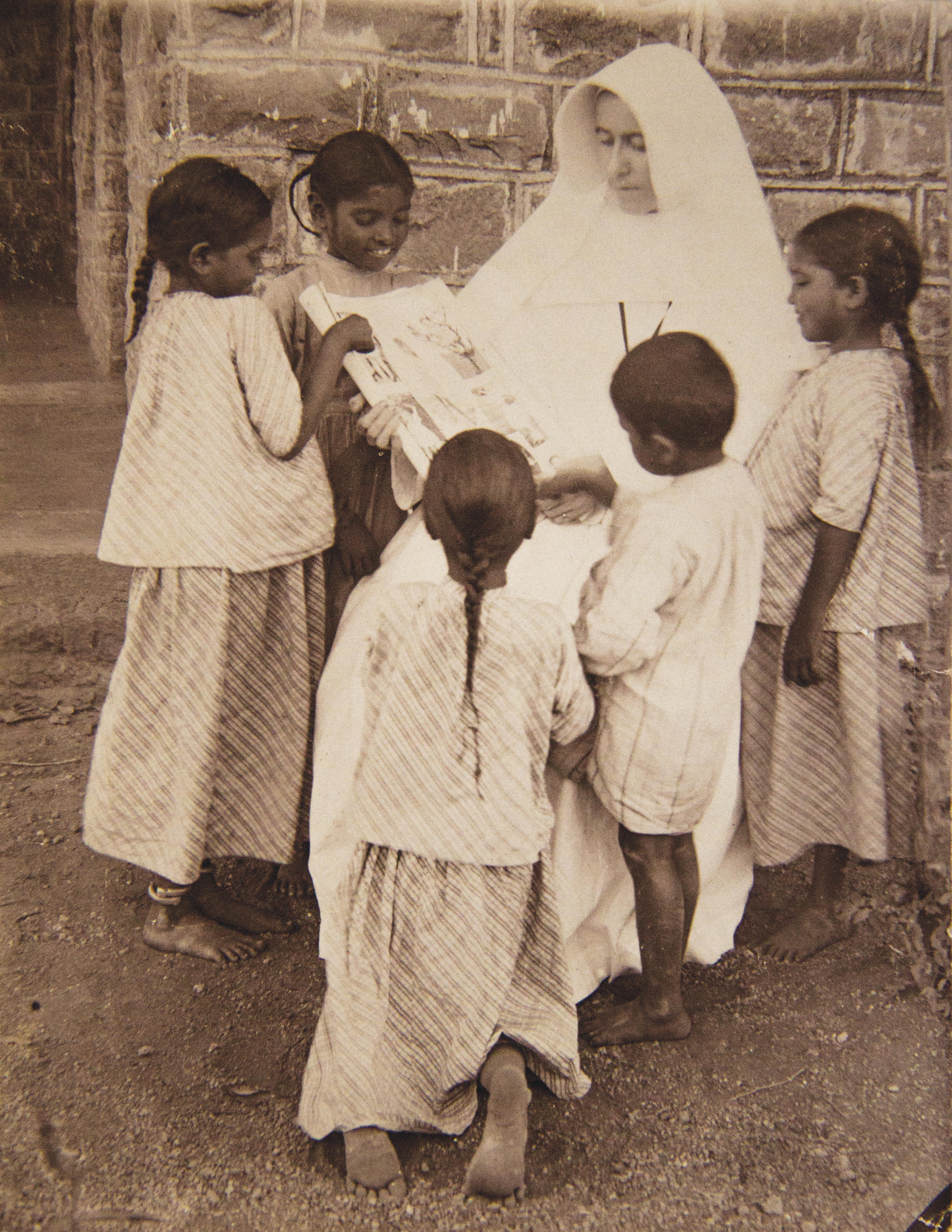



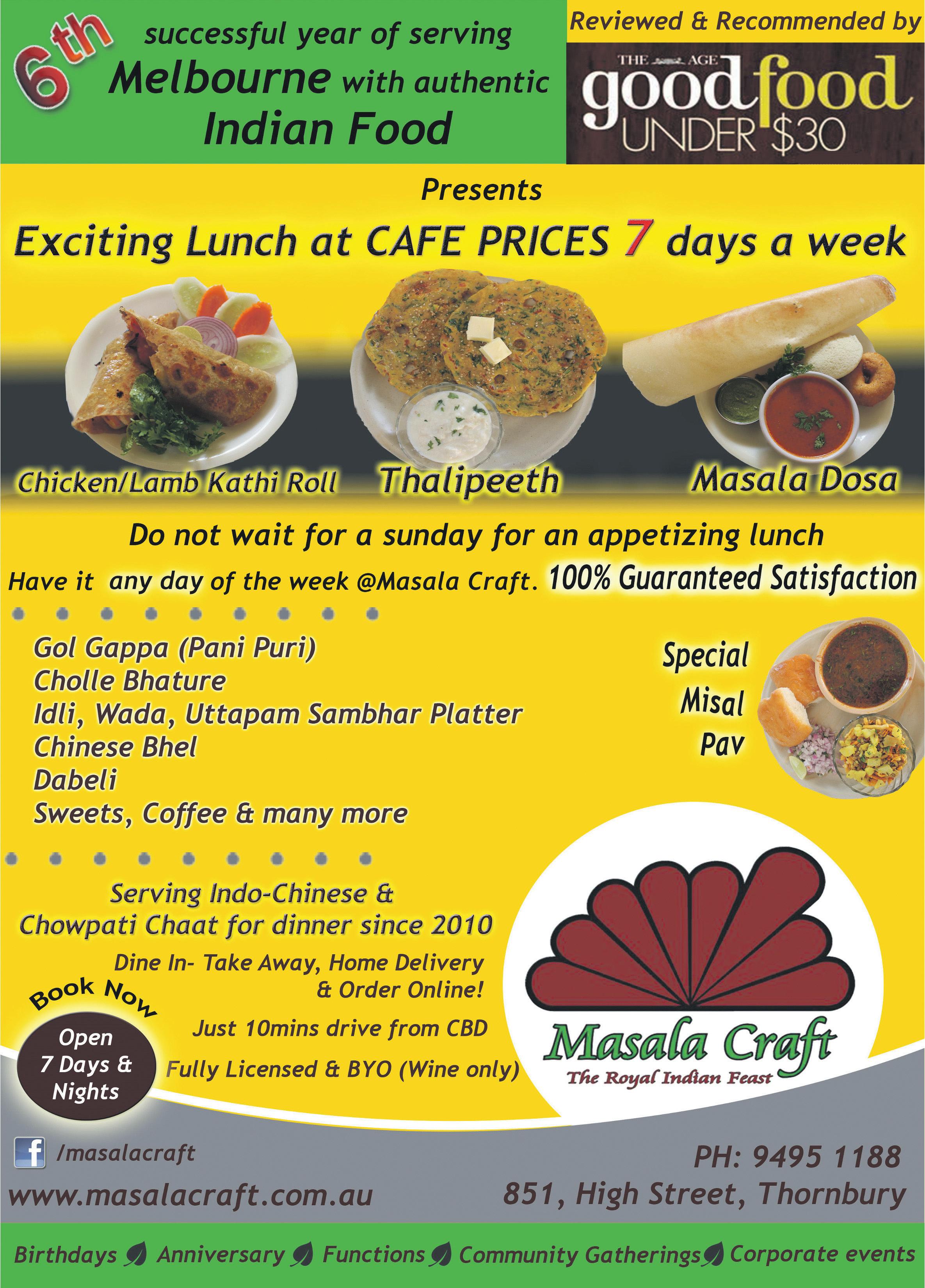


PUBLISHER
Pawan Luthra
EDITOR
Rajni Anand Luthra
ASSISTANT EDITOR
Sheryl Dixit
Lena Peacock
MELBOURNE COORDINATOR
Preeti Jabbal
CONTRIBUTORS








PUBLISHER
Pawan Luthra
EDITOR
Rajni Anand Luthra
ASSISTANT EDITOR
Sheryl Dixit
Lena Peacock
MELBOURNE COORDINATOR
Preeti Jabbal
CONTRIBUTORS
jobs and setting up homes.
ADVERTISING MANAGER
Ashish Chawla 0468 389 272
ADVERTISING ASSISTANT
Nitika Sondhi 02 9279 2004
DESIGN
Danielle Cairis
Proud member of:
Indian Link is a monthly newspaper published in English. No material, including advertisements designed by Indian Link, maybe reproduced in part or in whole without the written consent of the editor. Opinions carried in Indian Link are those of the writers and not necessarily endorsed by Indian Link. All correspondence should be addressed to
Indian Link
Level 24/44 Market St, Sydney 2000 or GPO Box 108, Sydney 2001
Ph: 02 9279-2004
Fax: 02 9279-2005

Email: info@indianlink.com.au
www.indianlink.com.au
They call it the ‘empty nest’ syndrome: the loss of a sense of purpose that develops in parents when the children leave home. As young adults move out to go to university or to a new job in another city, or because they are married, their middle-aged parents need to make adjustments in their own lives. The sudden feeling of bareness inside a home thus far filled with the exuberance of youth, can take some getting used to. Sometimes the loss of the close relationship with children can also lead to depression, particularly in mothers who have been the primary care giver in the family. This can be starker for stay-at-home mothers as compared to mothers who work fulltime or part-time.
For migrant Indian-Australian parents, especially mums who follow traditional maternal roles, this change in the family situation can stir up issues of identity. After migrating to a new country, often armed with tertiary degrees from back home, they set about building a new life, settling into
However, once the children arrive, there may be a collective family decision for the woman to stop working and become a full-time mother. Motherly responsibilities morph from preparing school lunches, drop-offs and pickups, canteen duties and homework supervision (and doing the odd school project themselves), to sleepovers, organising play dates, Saturday sport and selective school/HSC coaching, besides of course, running a full house. The professional world seems miles away. As the children grow into teenagers, their dependency on the parents gradually lessens until they are ready to leave home.
While it is manageable when the first-born leaves home for studies, or travel, or work, or marriage, the empty nest syndrome hits hard when the youngest goes out into the world.
After the initial feeling of freedom, there can be a sense of hollowness as the mother tries to find new meaning in life. By this time, the professional skill set and qualifications are out of date, and they could be at a time in their life when the desire to re-skill may be low. This issue of empty nesting could be at a difficult time when their own elderly parents are experiencing health and frailty issues. This emotional vacuum from a
generation above and the one below can be somewhat daunting. There could be perceived (or real) lack of support from the husband, whose energies are fully employed on the office front.
While there is no easy way to combat this situation, the women need to take this opportunity to find a new passion in their life. Efforts need to be made to rekindle the relationship with one’s partner. If there were activities like travel which were put aside for “when we are free of the kids,” these can be now be indulged in. When the motivation strikes, new skills could be acquired at TAFE or community college courses. These might well be hobby courses, such as art appreciation or photography. Exercise to get in shape and stay healthy could be another activity. Finding other empty nesters and organising travel and other adventure options can also be undertaken.
But perhaps one of the solutions is to be a bit more selfish while the children are growing up: start a hobby which can be carried on with more vigour when the children have left home. Planning ahead for this next stage of life, thereby ensuring that you’re looking forward to it, can make all the difference.
Pawan Luthra is the current Parliament of NSW Multicultural Journalist of the Year.

Bicentennial celebration
Sat 1–Sun 2 June 1pm-10:15pm
Mom-moorthigal Jayanthi and Swathi
Thirunal Bicentennial celebration, presented by Academy of Indian Music and Sruthi Laya Kendra. Kel Watson Theatre, Mahoneys Road, Burwood.
Sangeet Sandhya
Sat 2 June 8pm onwards
Open forum evening of Hindustani music by local artistes. All are welcome to attend and sing. Waverley Meadows
Primary School concert hall, Columbia Drive, Wheelers Hill.
Jyoti Thakkar sitar recital
Sat 15 June 8pm onwards
Enchanting sitar recital by Shrimati
Jyoti Thakkar, renowned Hindustani musician. Waverley Meadows
Primary School, Columbia Drive, Wheelers Hill. Tickets: $10 (all net proceeds will be donated).
Details: Radhey Shyam on 0402 074 208.
PCV annual dinner dance
Sat 22 June 7pm sharp
Punjabi Club of Victoria’s annual dinner dance event, with 3 course
Italian food and drinks, and DJ and dancing. Tickets: $85 adults only Veneto Club, 191 Bulleen Road, Bulleen. Details: Tej Panesar on 0421 380 700 or Inderjit Jasal on 0418 872 614.
Mrs Australia India Show
Sat 6 July 6pm onwards
Thonrbury Theatre, 859 High Street, Thornbury.
Details: Anamika Srivastava on 0432 059 798 or anamika2_in@yahoo.com

Chand Raat Eid Festival Sat 10 August Springvale Racecourse, Springvale. Details: Syed on 0412 881 597 or syed@cref.com.au
Vedic Society of Victoria
Every Sun 2pm
Adults learn to chant the Tamil pasurams and about the Sri Vaishnava tradition. All are welcome. To join by Skype, note Skype ID: Srivaishnavam. Children’s classes: same time and venue. Mount Street Neighbourhood House, 8, Mount Street, Glen Waverley. Details: www.srivaishnavam.org.au




At first, the sight of the gentle white doctor moving between earthen huts of Guntur must have caught the eyes of the villagers. Her face was serene, her eyes attentive. That this woman had left her successful surgery in Melbourne in 1920 and come, with the blessing of Pope Pius X1, to administer care to the sick and incurable of Guntur added further grace to her work. But soon her palliative visits to the lepers and cancer stricken of Guntur became

small township of Birregurra in Victoria, was a remarkable woman. Of Irish ancestry and the third of nine children, her childhood was scarred by the death of her younger brother Joseph.
Mary wrote of this by saying, “That hurt and gave me a first idea of what death meant”.
Mary moved from her home in the country Victorian town of Birregurra to matriculate in Melbourne. She was an outstanding student with wide ranging interests in literature and medicine and she entered Melbourne University on a scholarship. She became a full time medical student and graduated in 1910 with a Bachelor of Medicine and Bachelor of Surgery.
Mary published a pamphlet entitled Infanticide to state her
site and giving away her clothes and blankets to those in need.
Mary went on to found the Catholic Women’s League and establish a successful clinic in the centre of Melbourne, but one Sunday, her life changed.
“From the Cathedral, I went to my rooms in Collins St,” Mary wrote. “On the hall table there was a small pamphlet addressed to me. The pamphlet was about Dr Agnes McLaren, a pioneer Scottish doctor who at the age of sixty-one became a Catholic and at the age of seventy two, went to India to establish a hospital for the care of women. It brought me face to face with Christ. My life’s work lay clear before me now. It was to be medical mission work in India”.
She spent the next 37 years involved in medical work in
into St Joseph’s Hospital. She worked day and night, as the only doctor, attending to the infirm, as well as training local nurses and midwives in palliative care. She used her modern medical training in combination with traditional Indian medicine. She travelled to outlaying villages to provide comfort, prayers and medicine. Numerous photos of the time show her crouched beside lepers and the dying. She held, it is said, the most tender recesses of her heart for the incurable.
“She always wished me pleasantly, putting her arm around me and asking me to sit beside her,” recalls Elizabeth, one of her patients from the time, who is now an octogenarian. “I had
Mary established a small dispensary in Guntur, which grew into St Joseph’s Hospital
bouts of cough, but the touch of
On 2nd December 2010, Archbishop Denis Hart of the Catholic Archdiocese of Melbourne, announced that the preliminary phase of the cause for canonisation of Dr Sr Mary Glowrey had commenced in
Bangalore, India. On the 27th March 2013, Dr Sr Mary Glowrey JMJ (The Society of Jesus Mary Joseph), was declared a Servant of God by the Most Rev Dr Gali Bali, Bishop of Gunturat the Infant Jesus’ Cathedral, Phirangipuram.


Being declared a Servant of God is the first of four official approvals on the path to sainthood, and signals the commencement of the Diocesan Phase of the Inquiry
For any chance of the canonisation process being fulfilled, the following three further criteria must be met. • There is a widespread reputation of holiness of the person considered
On 2nd December 2010, Archbishop Denis Hart of the Catholic Archdiocese of Melbourne, announced that the preliminary phase of the cause for canonisation of Dr Sr Mary Glowrey had commenced in Bangalore, India
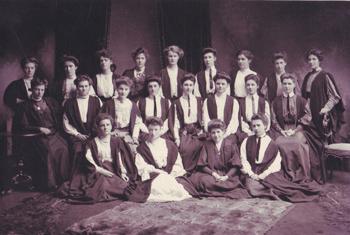


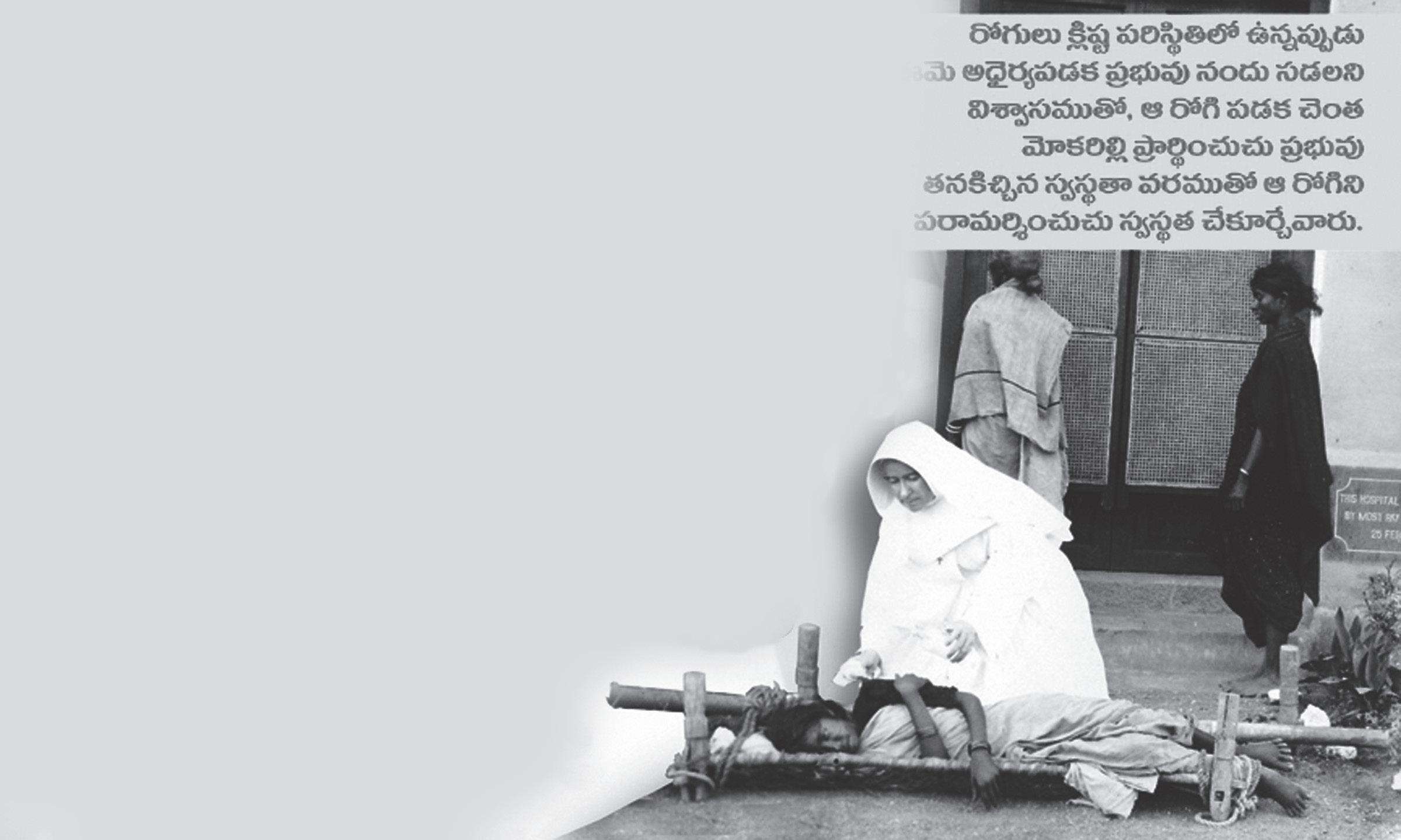



 All images ©Catholic Women’s League of Victoria and Wagga Wagga. Used with permission
All images ©Catholic Women’s League of Victoria and Wagga Wagga. Used with permission
Sr Mary used her modern medical training in combination with traditional Indian medicine, travelling to
• The person has lived a heroically virtuous life
• There is evidence of intercessory power, favours and/or miracles attributed to the person’s intercession
Archbishop Hart said it would be “the commencement of the diocesan phase of the process for possible beatification” for a woman who was said “to radiate Christ by word and example,”

bioethics convenor of the Catholic Women’s League of Australia, said the cause was “gathering pace slowly” in India and Australia in the past decade. She described Glowrey as “an outstanding “The commencement of the preliminary phase of the cause of Dr Sr Mary Glowrey has led to rapidly growing interest in the story of her life both in Australia and internationally,” said Robyn Fahy, a member of the Committee for the Cause of Sr Dr Mary
Father Dan Strickland and Jewell Start, current president of the Catholic Women’s League of Victoria & Wagga Wagga, travelled to Guntur for the beginning of the Diocesan inquiry into her cause for canonisation.
“Day 3 dawned bright and hot, and beckoned us to the pilgrimage part of our journey,” Father Dan wrote of his trip. “We made the hour and half drive past motorbikes, cows, trucks and cars to the city of Guntur, where nearly a hundred years ago Mary Glowrey had started a small clinic to begin the mammoth

task of treating the medical needs of the people of that area, and in particular the needs of pregnant women. The tiny clinic is still there, along with the dispensary, lovingly maintained and still in use for the purpose that Mary originally intended it. The furniture that Mary used remains largely in place, and still stores medication, papers and instruments. Her examining table, too, remains, and is still used to examine patients even today”. The Catholic hospital Mary founded in 1943 has become a multi-faceted operation, the largest NGO in India.
In an upcoming edition of magazine, Jewell Star writes: “One of the highlights of our visit to Guntur was a tour of St Joseph’s Hospital where Dr Sr Mary Glowrey had worked so tirelessly for 37 years. Walking in her footsteps was truly humbling. The places where Mary worked and lived have been lovingly preserved, and there are photos of her throughout the hospital to inspire others working in the JMJ (Jesus, Mary and Joseph) health apostolate. We were also blessed to meet several elderly JMJ sisters who had worked with Dr Sr Mary Glowrey, and cared for her in the final months of her life. Listening to their stories made Mary Glowrey ‘come to life’ for us”. A fellow nun who knew her well said, “It is almost certain that Sister Mary never attempted anything and never finished anything without seeking the aid and guidance of the Holy Spirit… She did attempt the impossible at all times and she tried to inspire others to attempt them also.”

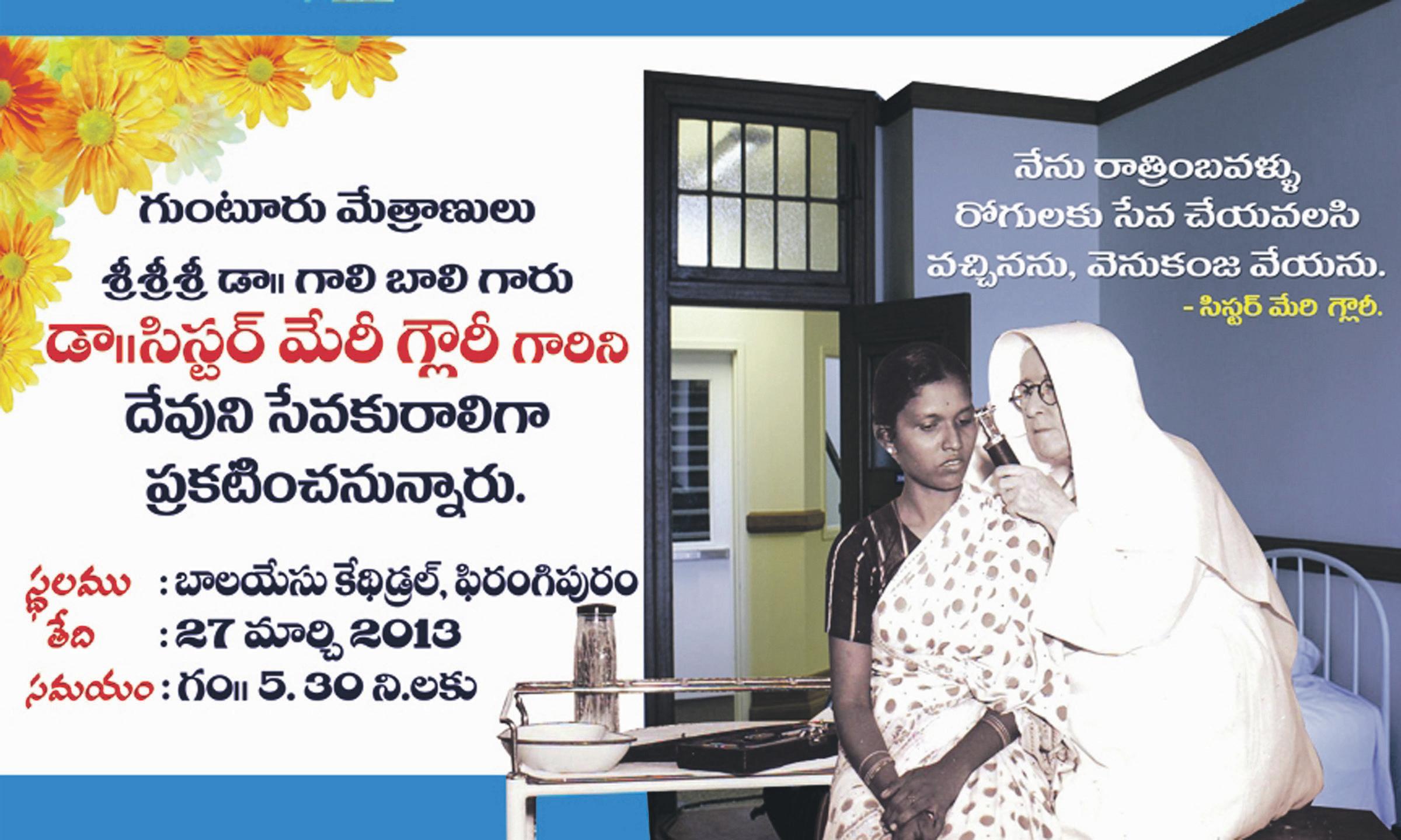
On the 5th of May, 1957 Mary uttered her final words, “My Jesus, I love you.”

She had suffered terribly from cancer in her last few years.
At her requiem Mass, the Bishop of Guntur described Mary Glowrey as a “…special creation of God…a great soul who embraced the whole world”.
If she is canonised, the great Mary Glowrey will be a symbol of the ties that bind Australia and India and a symbol of the power of compassion, love and dignity.

 BY SUJITH KRISHNAN
BY SUJITH KRISHNAN
Despite his humble upbringing in rural Australia, Sam Evans has carved a niche for himself in the realm of Indian classical music in Melbourne and beyond, with his instrument of choice being the tabla.

Sam has always had a fascination for drums from a very early age and has travelled the world for the sole purpose of discovering a percussion instrument that would electrify him. After extensive trips to Africa and different parts of Europe, Sam had his eureka moment in Varanasi when he spotted someone playing the tabla, and since then there’s been no looking back.
“I always wanted to excel at something and the tabla is what I’ve chosen to be good at,” he says.
Sam lived in India for nearly a decade, during which he learnt to play the tabla from renowned Pandit Anindo Chatterjee. Armed with a Bachelors, Honours and Masters Degrees in music performance on this instrument, he has performed live on Indian and Australian television, written music for documentaries and has performed on both national and international radio. He continues his stellar career, performing with a variety of bands at international jazz and world music festivals.
In Melbourne, Sam performs solo at tabla concerts and plays with a number of traditional Indian ensembles. He has also toured with internationally acclaimed Indian classical guitarist Debasis Chakroborty in both Australia and India, with whom he has released the album Charukeshi
Apart from his music commitments, Sam launched the Melbourne Tabla School in Hawthorn in 2007 and currently has about 50 students from all age groups. Additionally, he holds lectures on Indian and world music, as well as running a program on Indian rhythms at Monash University.
So when did it dawn upon him that he could make a living playing the tabla? “I started to learn the
instrument when I was 19, and there came a time when some people from the audience would ask me if I was willing to teach their children. It was due to this demand that the tabla school came into existence,” the livewire musician reveals.
Having watched Sam perform at concerts, one must admit that he brings a lot of fun and energy to his performances. “It’s a reflection of my personality and comes naturally to me,” he adds. “Also, we need to enjoy and have fun when we learn something, otherwise there’s no point in learning it”.
Being proficient in the classical genre, Sam believes that Indian classical music is in safe hands, despite the advent of technology
in music. “Ten years ago I would’ve thought Indian classical music was on the wane but since opening the tabla school in Melbourne, I am surprised by the number of people still very keen to learn the tabla extensively,” he says. “Moreover, learning to play an instrument is beautiful just like the fascination to read and write or learn a new language. It was Pandit Ravi Shankar who modified the elaborate traditional music structures of Indian classical music in America, and adapted it to suit the modern society we live in where everything is expected to be instant and immediate. So, Indian classical music has adapted very well and will never die,” he adds vehemently.
The versatile Sam is also part
of popular Melbourne-based band Fine Blue Thread that is steeped in the genre of world music. He adds, “our target audience is limited but we are now working on an album throwing in elements of pop, yet retaining our world music sound.” Their last album, Red Mountain, received rave reviews in Australia and Europe, and one of the tracks from the album was featured on a world music CD compiled by the BBC titled A Beginners Guide to the music of India alongside compositions by legends such as Ravi Shankar, Nitin Sawhney and Nusrat Fateh Ali Khan.
With a ceaseless desire to improve, the motivation to play the tabla after nearly 20 years comes naturally to Sam. “I don’t consider myself an expert yet and am still learning. I just want to keep going forward as there’s so much more for me to explore with this instrument,” he says.
As for the future, Sam is showing no signs of slowing down. He says, “I am almost through with writing a book on tabla notations primarily for the western audience which should be published soon. I hope to do a PhD in a few years’ time, and I want to see the tabla school grow into a few more outlets spread across Melbourne. Also, I would love to continue to explore different music genres with the tabla”.

He has also written a chapter on world music and the tabla in the Oxford Handbook of Music Education, which was released this year.






It’s atypical to come across Indians being part of an Aussie Rules Football team. And if it comes with an Indian name, the flavour is only accentuated. Masala FC (MFC) is a multicultural community team currently participating in the XVIII club competition organised by the Victorian Amateur Football Association.
Indian Link chatted with Trevor Banerjee, Operations Manager of MFC who works as a business and professional development coach in Melbourne. Trevor has a very positive outlook on life with loads of vigour and purpose, as was apparent in our conversation.
Having arrived in Australia 10 years ago as an international student, Trevor instantly embraced Aussie football, but at the time played the sport primarily for leisure.
“Opportunities for sport are very good in this country and I loved the fact that Aussie Rules Football offered me a platform to connect with the community,” he stated.
Masala FC is a club that came into existence in 2012. It was thanks to the Indian contingent that competed in the 2011 AFL International Cup in Melbourne, a tournament for non-Australian migrants, of which Trevor was a part. However, he gives credit to club president Ash Nugent, who is Australian, for coming up with the idea of forming a multicultural team.
“Ash and myself hit it off quite well in 2011 and when he came up with the idea of forming an AFL team I thought it was brilliant,” Trevor added. “I looked at it as an opportunity to integrate within
the community and therefore, got actively involved with administering the club”.
As for the title Masala FC, Trevor said, “Being a multicultural team we wanted a name that could encapsulate a mixture of communities and what better name than Masala!” When the club was in its infancy, it was decided to form a multicultural team in order to include players from various backgrounds, and not limit selection to just those from the subcontinent. “The mission of our club is more than a football club, we are a social hub,” summed up Trevor.
AFL team Richmond FC, a fervent advocate of promoting the sport within the Indian community must be applauded for once again playing an influential role in


organising training equipment and players’ kits for MFC.
As of now the team is composed of eight Indians, five Sri Lankans, one each from Zimbabwe and Afghanistan and 10 Australians, but Trevor says the club is on the lookout for more players. “Sport offers a wonderful medium for people to assimilate within the community and the fact that we have welcomed two asylum seekers to be involved just goes to show how Aussie Rules helps one fit in. Moreover, we need more players and experience is not mandatory at all,” he added. On what Australians think about MFC, Trevor says, “Some Australians have this impression of migrant communities forming their own ghettos, completely
refraining from assimilating within the community. Now I can tell them that we have an AFL team, so how much more integration do you need?”
As much as Australia wants the AFL to go global, there are some sections in society who haven’t yet come to terms with people from other backgrounds playing the game, as has been evident in recent times both on and off the field, with racial abuse being hurled towards players both at home and overseas. On this sensitive issue, Trevor vehemently comments, “We’ve only had support so far from the community. When I tell an Australian that I’m a part of an AFL team, there’s a sparkle in their eye which is priceless”.
MFC is here to stay and as a club, they have some realistic and ambitious goals set. They hope to form a multicultural women’s team next year, along with an Aussie Kick team for children. And more importantly, they want to take the game to India for which the groundwork has already commenced. “We have contacts in India who have begun to organise coaching clinics for children in West Bengal, Kerala, Maharashtra and Gujarat. In the future we also hope to organise a few friendly fixtures in different parts of India to popularise the game further,” Trevor revealed.
If you’d like to be part of MFC, visit www.masalafc.com.au for further details.
Sujith Krishnan


We would normally expect an Indian to be in charge of an Ayurvedic healing centre in Melbourne, but instead we are introduced to Peter Noblet, a professional Ayurvedic practitioner. This inspirational individual has twelve years experience in the field, and is an accomplished trainer of one of the oldest martial art forms in the world namely, Kalaripayuttu. Peter has been successfully running the Kalari Healing Centre in Highett since 2007. Walking into the centre, we are transported to a different world with a quintessentially Indian ambience.
Peter spoke to Indian Link about his foray into this rather unusual profession. After graduating in Ayurvedic medicine in 1999 in Australia, Peter travelled to Kerala where he stayed for a year gaining hands-on knowledge and experience in Ayurveda from Satguru Sri Hanuman Das. And it was during his stay at the Dharmika Ashram in Trivandrum that his Guru advised him to take up Kalaripayuttu, an ancient martial art that has its origins in the state. Peter travels to the ashram every single year for dharshan and to improve his knowledge and skills in both Ayurveda and Kalaripayuttu

So what lured him towards the ancient medicinal system? “I love the fact that Ayurveda is authentic,
earthy and a mystery that unfolds everyday,” he says. “Its beauty lies in its use of non-invasive medicines and techniques, and it has withstood the test of time. It comes with a lot of wisdom and the techniques applied in Ayurveda balance three important paradigms in a person – mind, body and spirit. Also, my desire to help and heal people has been the driving force behind my foray into this branch of medicine, which is not complex but humans are, and I want to make humans simpler,” he adds, tongue in cheek.
While nearly 80% of the population in India adopt ayurvedic treatment to cure various illnesses, this branch of medicine is almost complete unknown to people in Australia.

“People here don’t know enough about Ayurveda and it’s all about educating the community about its benefits through workshops and courses, which I organise quite often,” says Peter. But despite this lack of awareness, he took a calculated risk at starting the healing centre. “Yes, it’s been a risk and I’ve had to work really hard to promote Ayurveda in the community, but it’s a process which I’m committed to teach and pass on to the next generation.
I must admit though, that the reputation of KHC has grown in the local area. I have a regular flow of clients who visit me for various treatments such as yoga and meditation,” he claims.
Most people are under the impression that Ayurveda is less effective if started midway through a serious illness, but Peter vehemently says, “Modern medicines are effective, but they take a toll on the body. Ayurveda is preventative and in the case of
a severe illness, it helps restore balance between mind, body and spirit, which in turn helps eradicate the root cause of the disease”. But for this to work, the person must undergo a 2-4 week program wherein a complete overhaul of lifestyle is advised, including diet and other daily habits. For example, a cancer patient will first be put through procedures to cleanse the system to improve immunity and strength, following which treatment for the tumour will commence.
A few years ago, the Journal of American Medical Association published a report stating 20-30% of Ayurvedic products are toxic that go untested. “I haven’t come across any such product because the medicines I use are certified organic by a Swiss company. However, in the real world, due to the pressures of competition and profit motives, some companies do have a tendency to invest in short-term success without giving
any thought to the negative effects it can have on a person’s health. It’s sad and dangerous,” asserted Peter.
Moving on to Kalaripayuttu, Peter says that he is not an expert yet in this form of martial art, but he is an accomplished novice. “When my Guru suggested that I learn this art form I was taken aback, but nevertheless decided to give it a go. It helps in self-defence apart from maintaining a sharp mind and body,” he says.
Peter currently teaches children Kalaripayuttu at the healing centre every Saturday and considers this an honour. His advice on living a healthy life in these mystifying times is enlightening: “Know yourself - observe your habits, both mentally and physically. We should control our lives rather than let life control us. We must be open to change and never stop learning,” he says.
Being a regular visitor to Kerala, Peter is mesmerised by the

Ayurveda is
and in the case of a severe illness, it helps restore balance between mind, body and spirit, which in turn helps eradicate the root cause of the disease
simplicity and charm of the people there. He adds, “People there are content, have a simple outlook on life and that’s priceless!”
preventative
could match the selection of pure gold jewellery and its irresistible abundance dispassionately displayed by Mrs Pooran Lal.
President Mona Raju picked a beautiful mild, cream-coloured sari from her collection to grace the occasion.
Indian Senior Citizens
recently invited speakers who enlightened members about the climate of family violence that is rampant within Australian communities. It was hard to believe that family violence exists in the Indian community as well, even here in Australia.
President Prem Phakey introduced Poonam Mehra, from Hum Tum, and Roshan Bhandari from In Touch, Australia government initiatives that solace victims and also educate perpetrators. These are Task Force committees set up to create awareness about respectful relationships and gender equality within the eastern region Indian community of Melbourne.

Their objectives are to alter the culturally lingering attitudes and behaviours against family violence, and to promote mutual trust. Also to encourage effective communication and help build self esteem. Their motto is: “Break the Silence – Let us Talk”.
Poonam informed attendees that they have already and rather successfully completed two activities, Peace Prayers for the victims of family violence on White Ribbon Day in 2012, and by screening a free film Lajja, which deals with the issues of family violence.

Roshan from Cultural and Linguistic Care advised us of the CALC’s motto, which is to deal with family violence preferably before it occurs.
At present, CALC is engaged in dealing primarily with the Indian community, and also with the Sudanese and the Vietnamese communities. Sunila Srivastava, from Sankat Mochan committee, also motivated us to utilise facilities the government extends to us.
Poonam now invited Gary Ferguson, Community Education Coordinator from Seniors Rights Victoria, at The Council For The Ageing (COTA) office in the CBD. Gary was rather specific, and occasionally blunt. “You think since this has never happened to you before, so it

will never happen?” Gary argued. Through a Powerpoint projection, he presented data that was an eye-opener. In the 2011 census, presented Gary, we were 21.5 million Australians, out of which 5.53 million were Victorians, 14% of whom were 65 years plus. “The cultural code of ‘what happens in the family must remain in the family,’ which dictates the Indian psyche, must be broken,” said Gary vehemently while detailed factors that are tantamount to senior abuse. Mistreatment. Physical neglect. Insults. Fraud. Financial-psychological-emotional abuse, even sexual abuse of seniors is rampant in our society.
The best thing about Seniors Rights Victoria, Gary stated, was that SRV experts visit you at home if you cannot be at their office for any reason. They also arrange and pay for interpreters and solicitors,
and also court fees, if the matter ends up in the courts.
Gary advised the 150 members present to heed his discourse, because once we leave the meeting hall, we shall cease to be just seniors, but shall be educators in the community. He insisted that we promote a culture to talk, to ask questions, and to remember that help is available. SRV also has an office in Bendigo.
President Phakey then introduced Police Sargent Michelle Clooney, of the Family Violence Division. Excited to be promoting a valid cause, Michelle appeared out of breath and member Lalji very thoughtfully, brought her a glass of water. Sgt Clooney’s message was profoundly straightforwarded: “In case of need, call the police. Help is just a phone call away. Report if you see abuse taking place in
your neighbourhood and in your community,” Michelle advised. The speakers of the day were presented with token gifts, and free literature and booklets were at hand. Gary Ferguson may be contacted at 9655 2112, and Poonam Mehra on 0470 594 374.
Tandoori Junction served the delicious lunch at this enlightening meet. Wish our Bharat could have such facilities available for her citizens!
ISCA meets every second Saturday of the month. For more information, please call President Phakey on 9560 9607.
Kingston Indian Senior Citizens Association (KISCA) celebrated Mother’s Day with dhoom-dhaam. 70 odd members, invited artists and paying guests to display their jewellery and Mother’s Day best who filled the hall. But as is usually the case, no one

As always, the afternoon began by thanking the Lord for His many blessings with a bhajan Tum hi ho mata, pita tumheen ho. After this Mona announced, “Aaj ki shaam pyaari maan ke naam”. Suman Moolchandani read a poignant poem in memory of her mother, while Ashoka Jamini read his piece, as did many other members. Pooran Lalji apologised for karaoke-ing an irrelevant Mera joota hai Japani while veteran Barbara Nagaya also sang a karoke oldie Ai dil mujhe bata de, tu kis pe aa gaya hai’.
Raj Babbar sold raffle tickets, while many members carried the latest issue of Indian Link and shared relevant news with others. The air buzzed with excitement, activity and Bhojpuri/Purabia dialects from Fiji Indians.
Accompanied by his family, Sateyendra Misra arrived. Sateyendra is from Guru Radhey Shyam Gupta’s Sangeet Sandhya, a monthly program of dance and music that is presented by Sharda Kala Kendra. Mona welcomed and introduced them, and immediately Saurav, the son-in-law, in his rich voice, presented Sri Ram Chandra kripalu in pertinent Raag Yaman, which is necessarily sung around the hours of 6 -7pm. The family joined in, singing many Bollywood songs. Misraji’s granddaughters aged 12 and 7, delighted us with a Shri 420 song, Ichchak-dana –bichchak-dana
Misraji himself attempted a rather difficult number only Manna De could tackle, that of Yeh vandana sun hamaari, daras tere maange yeh tera pujaari. Misraji sang another demanding Manna De, in Raag Hansa Dhwani and in Braj Bhasha, which Lord Krishna himself favoured, Jaa, to se naheen boloon, Kanahiya. Raah chalat pakre mori bahinya.
The raffle was drawn, and all the mothers were honoured with token gifts donated by members. The meal that followed was delicious.
KISCA meet every third Sunday of the month. For more information, please call President Raju on 9782 8973.
has been established for SMK, and to date, collections stand at more than $20,000. There is also a verbal commitment from devotees of nearly $50,000.

For a group of devotees of Sankat Mochan Samiti (SMS), the Sankat Mochan Kendra (SMK) has now become a real passion, leading them towards active fundraising to establish SMK. As a part of this initiative, they organised a Mother’s Day dinner and dance event on May 11, at the Spirit of India Reception Centre.
The evening began with a welcome address by Deepa Bhatia, the main organiser of the function, followed by a series of songs relating to Mother’s Day that were melodiously sung
by Arvind Shrivastava, Rajeev Gossain and Rakhil. Dr Sunila Shrivastava, President of SMS then took the stage and offered a brief description about the organisation’s objectives and activities. Community leaders Dr Santosh Kumar, President of NRISA; Dr Arun Kumar, Past President of Hindi Niketan and IIT’s Past Students Association; and Dr Dinesh Parikh, Trustee of HSV Cultural Centre were invited to share their views about the activities of SMS. They complimented the efforts of SMS towards its religious involvement,
social welfare and educational activities, and promised their continual support.
While the entrée was being served and guests walked around the various jewellery and cosmetics stalls, the next segment of the evening was handed over to the younger generation. Neha Bhatia led a fashion parade of a different kind to beats provided by DJ Kartik. Neha, accompanied by Ruchi, Rhea and Ashunta gathered mothers of all ages from the audience to participate in a fun filled fashion show, where

they were asked unique questions and the opportunity to win exciting prizes.
It was a very entertaining evening, enjoyed by all present to the extent that there was an overwhelming suggestion from the floor to organise a similar function to celebrate Father’s Day on August 31. Such was the enthusiasm from the audience that the date was fixed on the spot, and a few people even came forward to volunteer to organise the Father’s Day fundraising event for the SMK. A separate account
Sankat Mochan Samiti (SMS) extends its appreciation to Deepa Bhatia, Satish and Manju Gossain, Krishen and Santosh Pandita, and Vinita Bhatia for organising this wonderful initiative, and to all the ‘young by age, young at heart’ people who actively participated in the events of the evening. Support from NRISA members, Raghav Bhatia’s team and the excellent MC work done by Neha Bhatia and the judging team, collectively contributed to a very successful and memorable Mother’s Day celebration.
Upcoming events will be the Sankat Mochan Mahotsava on July 27, Father’s Day fundraiser on August 31, and Mata Ki Chowki and garba dance to celebrate Shardeeya Navaratri on October 5.
To support e-mail sankatmochasamiti@gmail.com or ring Sunila on 0427 274 462.




were the major highlights at a recent event held in support of Liberal party’s Emanuele Cicchiello. Emanuele is the Federal Liberal candidate for Bruce, an outer Metropolitan electorate that includes the suburbs of Dandenong North, Noble Park, North Mulgrave, Wheelers Hill and parts of Clayton, Springvale, Glen Waverley and Notting Hill. Perminder Rayat from Consolidated Insurance Agencies and Paramjit Jaswal of Imperial College of Technology and Management were the main sponsors of this fundraising event.
The turnout at the Beau Monde International was impressive, despite the event being held on a weeknight. The guests comprised mainly of members from the Indian community, media and local business owners. Russell Hannan as the MC acknowledged the dignitaries, moderated the questions and conducted the auction with the ease that comes from experience. Paramjit Jaswal from Imperial College introduced the chief guest Scott Morrison, MP. Representing the division of Cook in New South Wales, Mr Morrison came into cabinet for the first time in 2009 during Tony Abbot’s cabinet reshuffle, shortly after winning leadership of the Liberal Party. The former Managing Director of Tourism Australia and State Director of the Liberal Party, Mr Morrison, is currently the Shadow Minister for immigration and Citizenship and


“I want to restore confidence in our immigration system,” declared
to achieve is to stop the boats for many reasons. Many people have died on those boats, and safety and lives are compromised.
Refugees across the world who have been waiting in the system for years are being denied places because of those who come illegally by boats. Australians have already seen $10.3 billion in budget blowouts due to Labor’s border failures, including $5.3 billion since last year’s budget. By reinstating proven border protection policies we can stop the boats and end this cost, chaos and tragedy,” he said.
The Minister went on to criticise the Labor Government for their ‘disgraceful’ attack on skilled migration in relation to 457 visas and Minister Brendan O’Connor’s allegation that people are rorting the system. According to Minister Morrison, there is no evidentiary basis for these claims. He said that without any justification, the Government is planning on cracking down on people using this system, including a large percentage of Indians.

According to him, 1 in 5,457 visas in Australia and almost 1 in 3 visas in Victoria are being given to people of Indian nationality.
“The health system is another significant sector that utilises 457 visas, so all the doctors and nurses and health workers who are engaged in jobs in rural areas are apparently all rorters of this system who this Government says need to be cracked down upon,”
said the Minister. He alleged that this is a veiled criticism and attack on communities like Indian, Chinese, Irish and Philippines who are the top four users of this system. Mr Morrison went on to say that the real reason behind this rhetoric is the union movement that has always opposed 457 visas and the Government cost cuts and budget blowouts that have caused these problems.
The floor was then opened for questions from the audience, followed by an introduction to the potential member for Bruce. 39-year-old Emanuele Cicchiello is Deputy Principal at Lighthouse Christian College in Cranbourne, and has served as both a Councillor and Mayor with the Knox Council. According to Emanuele, his family came to Australia in the 60s seeking hope, reward and opportunity. Most immigrants, including those from India, come with similar aspirations. “Today if any of us wish to have a future full of hope, reward and opportunity, this will be possible only from September 14 if Australians choose Tony Abbott as their Prime Minister and Scott Morrison as their immigration Minister,” claimed

Emanuele. He went on to allege that under the current government, Australian businesses are hurting and they need a change. He urged all business owners who agree with him to vote for Liberals and get rid of the current chaotic government. Emanuele kept his speech short to allow for the program to proceed. Generous bids were made during the auction which followed the formal proceedings. Auction items included a 50 inch LG Plasma TV, accommodation for 2 people at Beau Monde and a Heli Experiences helicopter ride to Yarra Valley. An autographed
cricket bat from the historic 2003 Top End Tour match between Australia and Bangladesh raised the entertainment quotient and bid considerably and finally went to Paramjit Jaswal for $16,000.
Emanuele acknowledged his generous support by promising to take Jaswal along with him to Australian magnate Solomon Lew’s house for a breakfast meeting the next day. The evening officially concluded at this stage, but some stayed behind to socialise and to get acquainted with Emanuele and his wife Isabella.
Preeti Jabbal

















Hearts were opened and legs were shaken at a sparkling and memorable night at Thornbury Theatre in Melbourne recently. Guests at Muskaan’s ‘Bollywood Bedazzled Charity Ball’ became dance stars, enthused by the mixing skills of DJ Baba Saheed and motivated by Jhoom Bollywood’s dance moves!
Within the elegance of Thornbury theatre, they were delighted by the surprise appearance of colourful solo dancer Annabella, whilst enjoying a delicious three course buffet meal.
The Jhoom Bollywood Dance Group followed, brilliantly engaging everyone with their performance and energetic dance workshop. Judging by the happy, smiling faces, a fantastic night was had by all, including the honoured guests who themselves took to the floor to practice some unique dance moves.
Honoured guests at the night were Mr Raj Kumar, Acting Consul General for India; Mr Steve Herbert, State Member for Eltham and Shadow Minister for Education; Mr Jude Perera State Member for Cranbourne and Co Chair of the Victorian Parliamentary Friends of India;
and Mr Arjun Surapaneni, CEO of V.I.T and member of the Multi-Cultural Business Ministerial Council, Victoria.
250 guests across the local and Indian communities danced to the music with joy and appreciation, while being aware of their fortunate circumstances here in Australia. They opened their hearts with love and generosity for those born into less fortunate circumstances in Bhopal, Madhya Pradesh, at this special fundraising event from Muskaan. The guests were reminded about the fundamental importance
of educational opportunity to break the cycle of poverty and disadvantage.
Card raffles, secret door keys, and table raffles as well as a ‘Silent Auction’ all contributed to funds for the construction of the Muskaan school campus. Prizes were generously donated by both Indian and Eltham businesses. Recognition was given to sponsors and donors to Muskaan, both on the program and throughout the evening.
The event was organised by Muskaan Support Australia Inc, an Eltham-based charity established
by Marion and Kevin Hadingham following Marion’s experiences teaching at Muskaan, a school for children from the slum communities of Bhopal. Marion shared the reasons behind her passion, followed by friends Dharmesh Khanna and Anushri Rastogi both from Bhopal,
who spoke with compassion for their hometown.
Muskaan Support Australia’s ‘Bollywood Bedazzled Ball’ was a sensational night packed with energy colour, joy and appreciation. It opened hearts with love!
ElizabethKnight
Pichumani School of Carnatic Music presented a vocalduet concert by Smt Rama Ravi and Smt Nanditha Ravi on May 11 at the Wellington Secondary College. The mother-daughter duo from Chennai is a torchbearer of the hoary Veena Dhanammal music tradition. Smt

Rama Ravi is an A-top graded vocalist, and her daughter and disciple Nanditha is an A-graded artist of All India Radio, Chennai. Smt Rama Ravi sings Carnatic music of the golden era, having been trained by eminent musician DK Jayaraman, and T Viswanathan and T Brinda, renowned grandchildren of the legendary musician Veena Dhanammal. Their style is very much grounded in the classicism of their guru’s tradition – a style that has more or less fallen on evil ways in recent times. Their unhurried approach to the rendition of the alapanas, kritis and kalpana swaras harked back to a bygone era, and
those who like their Carnatic music soaked in the spirit of the an earlier period, would not have been disappointed. The duo began the concert with a popular varnam in Kaanada, which set the tone for the rest of the concert. It was so silky-smooth and melodious that the audience was unobtrusively
drawn into their music. The kriti, Vinaradana was rendered beautifully, which they followed up with the popular composition Brocheva in raga sriranjani. They gave it the full treatment, with a masterly session of kalpana swaras at the end. The next kritis Nadopasana, Marivera dhikkevaru, followed by another
in raga ananda bhairavi (Kaappaduve unadu bharam) were almost therapeutic to listen to – as their slow melody gradually enveloped the listener. The raga saveri which brought up the next number had the hallmark of the Dhanammal bhani as well, with their wellchiselled and crisp kalapana swaras
rendered in an unhurried style. This was evident too in the duo’s concluding pieces.
They were accompanied by Melbourne’s own senior musicians Sri Murali Kumar on the violin and Sri Sridhar Chari on the mrudangam.
ChitraSudarshan
Do you hAve ACCeSS to $100,000

If So you CoulD be pArt of thIS flAGShIp pIzzA frANChISe. thIS offer IS opeN for A lImIteD tIme oNly.
vICtorIA:
• Domino’s pizza vermont

• Domino’s pizza langwarrin
• Domino’s pizza mt Waverley
• Domino’s pizza malvern
• Domino’s pizza Sydenham
• Domino’s pizza Doncaster east
• Domino’s pizza Corio
QueeNSlAND:

• Domino’s pizza Nambour
• Domino’s pizza Ipswich
• Domino’s pizza Gladstone
NSW: GolD CoASt:

• Domino’s pizza palm beach
• Domino’s pizza burleigh heads
• Domino’s pizza helensvale
• Domino’s pizza Narrabri
• Domino’s pizza Gunnedah
SA:
• Domino’s pizza elizabeth South
Gautam Jain 0404 077 079


respectively, and allege that each player knew of the others’ involvement.
BY RITAM MITRACricket once again finds itself shrouded in controversy, and for the second time in as many years, it is the IPL at the centre of the crisis. Sreesanth, Ajit Chandila and Ankeet Chavan, all representatives of the Rajasthan Royals franchise and members of Ranji Trophy teams, were arrested on May 16 for their alleged involvement in a spot-fixing scandal that has resulted in the now customary effigy-burning, widespread streetside protests and the assurance that if found guilty, the accused will be dealt with severely. The only thing missing, as usual, is the promise of a solution.
Spot-fixing, which involves the fixing of an outcome within a match rather than fixing the result of the match itself, famously came into the spotlight in 2010, when a News of the World sting operation secretly videotaped bookmaker Mazhar Majeed promising a set of no-balls on pre-determined deliveries bowled by Pakistani quicks Mohammad Amir and Mohammad Asif. The following year, the duo, along with captain Salman Butt, were found guilty, and were sentenced to between 6 and 32 months in prison.
Last year, five IPL players were suspended by the BCCI for various offenses, including negotiating fees for bowling noballs in the IPL, as well as ‘loose talk and unsubstantiated bragging’.
Sreesanth, Chandila and Chavan stand accused of agreeing to concede a minimum amount of runs per over. They were alleged to have been promised between US$36,000 and $109,000 per over. While investigating leads that suggested that the Mumbai underworld was indulging in spot-fixing, Delhi police chanced upon evidence that suggested the three players were involved. After keeping the players under surveillance, the investigators waited for the right moment to pounce, arresting them at different locations. Police have filed cases under section 120b and 420 of the Indian Penal Code, relating to criminal conspiracy and cheating
The three matches in question took place on May 6, May 9 and May 15. On May 6, Chandila conceded the agreed-upon 14 runs in the second over of his spell, but failed to give the signal the bookmakers required of him – looking skywards and lifting his shirt. This meant that the bookmakers couldn’t place their bets for fear he’d back out – and they demanded a refund of the money they’d given him in advance.
On May 9, Sreesanth was told to put a towel in his trousers before the start of his second over, and spend some time placing the field and stretching so as to give the bookmakers enough notice to place heavy bets. He conceded 13 runs off his second over – one short of the agreedupon 14 runs, but bookmakers usually keep a one-run cushion in case things don’t go completely right. On the last ball of the over, Sreesanth appeared to move his hand away from a badly-timed Gilchrist straight drive.
In the final match under allegation, on May 15, Ankit Chavan was asked to give at least 13 runs off his second over. After conceding just two runs in his first over, Chavan gave the signal indicating bets were on for his second – fiddling with his wristband. He conceded 14 runs off just the first three balls of his second over – but the rest of the over went for only one run.

The problem with spot-fixing is that it is so difficult to track.
In the spot-fixing scandal of 2010, bookmaker Mazhar Majeed assured the undercover journalist that there would be no signal ahead of the pre-determined no-balls. Meanwhile, the signals in the most recent scandal were so nondescript, they could never have been considered suspicious.
It is no longer an excuse to say players are uneducated about the dangers of spot-fixing, or were forced to do so in order to make a living. It is for this reason that Sreesanth in particular, has raised the deserved ire of the public, given his status as a former Indian Test player and World Cup champion currently on an IPL contract of $400,000 for two months of cricket. It is embarrassing to now hear an
It is no longer an excuse to say players are uneducated about the dangers of spot-fixing, or were forced to do so in order to make a living
interview Sreesanth gave in 2011 regarding the Pakistani spot-fixing scandal, where he says, “Even I know nothing like that is going to happen to Indian players for sure, because I think we are surely, either the way we are brought up…we are much more educated in that process”.
Clearly the education didn’t pay off for Sreesanth. His father may accuse MS Dhoni and Harbhajan Singh of conspiring against his son, but as Delhi police so eloquently put it, Dhoni didn’t put the towel in Sreesanth’s pants.
Spot-fixing cannot be put down to the fact that betting is illegal in India; there is no way to fully eradicate corruption in any major sport. For instance, the Pakistani spot-fixing scandal took place in the UK, where there are legal markets for gambling on sport.
The solution is not as simple as increasing the powers of the Anti-Corruption Unit, or putting stricter penalties in place and legalising betting. The law can only do so much to deter wouldbe cheats. The sad fact is, human greed often triumphs over good sense in people of weak character – and they’re only ever apologetic
if they get caught. It is the height of irresponsibility, selfishness and stupidity for these individuals to take away from a game that has given them everything they have; yet there is very little that might have deterred them other than the fear of being caught.
As a comparison, you do not avoid stealing purely because you fear being caught – it is simply wrong.
The most haunting aspect of spot-fixing for convicted fixers must surely then be the thought of cheating hundreds of millions of followers, or having to explain to their children, either now or in future, why they are not playing cricket anymore, or why stones are being thrown at their home and photos of them are being burned by angry mobs. And it is perhaps this moral culpability that must be more focused upon in the players’ education. In the age of social media, it’s become much easier to reach the celebrity; if proven true, these allegations will change the lives of three young men forever. If found guilty, Sreesanth and his co-conspirators must be dealt with severely. But how many cases will it take to set an example?
It is the height of irresponsibility, selfishness and stupidity for these individuals to take away from a game that has given them everything they have; yet there is very little that might have deterred them other than the fear of being caught
Spot-fixing, which involves the fixing of an outcome within a match rather than fixing the result of the match itself, famously came into the spotlight in 2010
Tendulkar bids adieu to IPL after Mumbai Indians’ success
Batting great Sachin Tendulkar bid adieu to the Indian Premier League, two days after his illustrious former India teammate Rahul Dravid, and moments after his side Mumbai Indians were crowned champions at the iconic Eden Gardens on May 27.
Tendulkar, who retired from ODIs in December last year, missed his team’s final against two-time champions Chennai Super Kings due to an injury on his left wrist he picked up while batting against Sunrisers Hyderabad on May 13.
“This is my last IPL. I had taken the decision before the start of the tournament,” said the 40-year-old Tendulkar in a matter of fact way as the TV interviewer was taken aback.
“I have waited 21 years to win the first World Cup and six years for the IPL. It has been a great and memorable journey with the team,” said Tendulkar, who got a grand sendoff as he was lifted by his team mates before the customary victory lap.
Tendulkar’s wife Anjali also joined in minutes later.
“We have to be realistic about it. I’ve played six seasons with the Mumbai Indians and I have completely enjoyed it. This was the best season for Mumbai Indians. Before this, 2010 was the best season,” he said.
Soon after, his teammates clamoured to get him in the centre while posing for group photographs.
“This is the perfect time to say thank you to my supporters and well-wishers. I cannot wait to lift the trophy,” said the little master.
Tendulkar scored 2,334 runs averaging 34.83 in 78 IPL matches. He has a strike rate of 119.81 and struck one century and 13 fifties.
“I think this is the right time to stop playing the IPL. I am 40. Got to accept it. I had decided this was my last season”.
On May 25, another Indian great Dravid had announced his retirement from the IPL after his side Rajasthan Royals went down to Mumbai Indians in the play-off. Days ago, Australian legend Adam Gilchrist also announced his decision to quit playing the tournament.
Iraq may increase oil supply to India by 30 percent:
Iraq is likely to increase oil supply to India by around 30 percent as shipments from regional rival Iran drop following sanctions from the US and European countries, a senior Iraqi minister has said in New Delhi.
“India has requested 80,000 barrels per day of additional crude oil supply. We will increase the supply depending on the availability,” Iraq’s Minister of Water Resources Mohanad Salman Alwan AlShaibani said in an interview.
Iraq recently became the second largest crude supplier to India, replacing Iran. Iraq supplies around 300,000 barrels per day (bpd), nearly 11-12 percent of the country’s total demand.
India has been seeking increased supply of crude from countries like Iraq and Saudi Arabia, as imports from Iran are becoming difficult due to Western sanctions.
India has also requested Saudi Arabia, the largest supplier of crude accounting for almost one-fifth of the country’s needs, to increase the supply by 100,000 barrels per day.
Al-Shaibani said Iraq targets to raise oil production to 2.9 million barrels per day by
the end of this year from 2.6 million barrels per day recorded in April.
“With the increase in our overall production, we will increase supply to India,” Al-Shaibani said.
Iraq, which holds the world’s fifth-largest proven crude oil reserves, overtook Iran last year to become the top producer, after Saudi Arabia, in the Organization of Petroleum Exporting Countries (OPEC).
The minister claimed that there were huge demands for Iraqi oil and the country targets to enhance production sharply in the coming years that would help finance its development activities.
“India is one of our biggest trading partners. We share excellent relations with India and are keen to enhance trade and investment further,” he said.
Al-Shaibani said Iraq welcomed Indian investments in oil exploration, refinery as well as in other sectors.
Major public and private Indian companies are expanding their business in Iraq. Iraq’s Ambassador to India Ahmad Tahsin Berwari said Reliance Industries Limited (RIL), along with six other global firms, were recently shortlisted for development of the multibillion-dollar Nasiriya oilfield project.
Jindal SAW Ltd. has won a $198 million contract to build and operate a factory for manufacturing oil and gas pipeline in Southern Iraq.
“A lot of other Indian companies are showing interests. They are comfortable doing business in Iraq,” said Al-Shaibani.
When asked about the security concerns, the minister said in central and southern Iraq the situation has improved substantially and the government is trying to improve the situation in other parts of the country as well.
Families of patients needing an immediate organ transplant for their survival would soon find it easy to locate a potential donor with the Indian government coming up with an online network containing necessary details like the blood group and organs available for transplant.
The online network, which is being set up under National Organ and Tissue Transplant Organisation (NOTTO), would list all potential donors and recipients along with
information like their blood groups and other medical details, a senior health ministry official disclosed on condition of anonymity.
“We are soon going to set up an online network under the National Organ and Tissue Transplant Organisation. The online service will be able to connect people directly to the donor,” the official said in New Delhi. NOTTO, an autonomous body under the health ministry, would be the nodal agency coordinating all organ transplants in the country.
The official said the National Information Centre, which is the premier government organisation involved in IT applications, has been entrusted with the task of setting up the online network.
All hospitals in the country, whether private, public or district-level health centres, will be part of the network.
Harsh Jauhari, chairman in the department of renal transplant at the Sir Gangaram Hospital, said: “Hospitals as well as patients or their families can match their requirements online and as soon as the needs of a potential donor and recipient meet they can contact each other”.
Jauhari was one of the experts that advised the government on the online service.
“The names of both donors and recipients would be deleted as soon as their requirements are met,” Jauhari said.
According to Director General of Health Services (DGHS) Jagdish Prasad, NOTTO will be set up at the Safdarjung Hospital in south Delhi. “The building is ready,” he added.
Anoop Misra, chairman, Fortis Centre for Diabetes and Metabolic Diseases, said: “We needed something like this very much. At least the process should be started”.
He said networks like these are already in place in the US.
“It is a doable thing and a patient-driven necessity,” said Misra.

Under NOTTO, the government will give funds to private and public hospitals to appoint a coordinator for organ transplants. Free software would also be given to all centres.
Apart from NOTTO, four regional centres would also be set up across the country.
The step was acutely felt after a kidney transplant racket was busted five years ago in which many poor people were lured and were then secretly operated upon, and their kidneys removed.
The government then brought changes in the Transplantation of Human Organs Act (THOA), 1994, specially for the benefit of patients of renal failure.
About 200,000 people are diagnosed with renal failure every year and for most, the only cure is a kidney transplant. But less than 3,000 transplants are carried out annually in India due to strictures on possible donors under the present law.
The amended act allows organ donations from a “near relative,” which it defines as spouse, son, daughter, father, mother, brother or sister. The amended law broadens the definition of “near relative” to include grandparents, grandchildren, uncles and aunts.
Also, not-so-close relatives who have stayed with the patient can donate organs, provided there is no commercial dealing.
The law makes the swapping of organs between two unrelated families legal in cases where organs of willing near relative donors are found medically incompatible.
But the swap should be without any commercial transactions, it stipulates.
Indian Ambassador Nirupama Rao has hailed Indian-American Srikanth ‘Sri’ Srinivasan’s Senate confirmation as a top US judge as yet another proof of the Indian community’s “sterling contributions to the US society and India-US relations”.
Srinivasan’s confirmation as a judge on the powerful appeals court for the American capital, “considered among the most important positions in the US judiciary, is testimony to his credibility and calibre as a brilliant legal luminary of this country,” she told an ethnic TV channel and website from Washington recently.
“Born in India to Indian parents, Srinivasan’s well-deserved rise to the top echelons of the American judiciary - the first by an Indian American to such a position - is indeed a matter of great pride and satisfaction for India and the Indian American community,” Rao said.
It was “yet another proof of the sterling contributions of our community to US society and indeed, to India-US relations,” she added. IANS
Ladies, Prabhudeva is single ready to mingle! The recently turned 40 tall, dark and arguably handsome Indian superstar was in Melbourne in June to attend the Indian Film Festival of Melbourne.
“It’s all about work and only work for me at the moment, but who knows I might find someone here in Melbourne,” said Prabhudeva with a mischievous smile, when asked if there was any special person in his life at the moment. A divorce from wife Ramlath and a split with actress Nayantara saw Prabhudeva join the ranks of the very eligible. His celebrity status, the almost godlike reverence from innumerable fans, the box office success of his super-hit movies and his recent foray into Hindi films has kept him occupied, but he is open to sharing his life with the ‘right person’.
South Indian sensation

Prabhudeva was in Melbourne to also promote his upcoming film Ramaya Vastavaiya that is slated for release on July 19. Accompanying him was the film’s hero, newcomer Girish Taurani, son of managing director of Tips Industries Limited, Kumar Taurani. Girish will feature in this film produced by his father, opposite Shruti Hassan, daughter of veteran actor Kamal Hassan and Sarika.
Prabhudeva not only directed this film, he also took up the role of mentor for Girish and groomed him for three years to prepare him for his debut in the Hindi film industry. Indian Link had a chat with Prabhudeva and Girish at the opening night of the IFFM.

Prabhudeva’s magical touch that has made him a household name in south India, has worked in the Hindi film industry as well, with box office hits like Any Body Can Dance and Rowdy Rathore. He does not, however, find the two industries dissimilar. “The difference is in the units, each film has a different cast, story line, location etc. but I do not think that there is anything that sets apart the industries in the south or the north, I work equally hard for both,” said Prabhudeva.
“I am happy if my films are
commercially successful, if they gain critical acclaim as well, I consider that as a bonus!” he added. Besides directing films, Prabhudeva has also worked as an actor, dancer and choreographer, and dealt with several aspects of film-making. According to him, of all these roles he gains the maximum satisfaction from being a dancer. “I love dancing, I even dance to songs when I am behind the camera,” he said in reply to my question about how he keeps fit and fabulous.
Fitness was definitely on the agenda for Girish Taurani, judging by the muscles that adorned his biceps that were quite at odds with his chocolate hero looks.
According to reports, Prabhudeva spent considerable time and efforts in helping Girish to learn dance techniques in preparation for his debut in the film industry. Are dancing abilities inborn or something that can be learnt? “I did not teach Girish how to dance; I helped him to get a feel of dancing and to gain confidence as a dancer,” said Prabhudeva. Girish backed him by referring to a dialogue in ABCD (Any body can dance) where Prabhudeva says that dancing is
within us, even the heart beats to a rhythm, and rhythm is a part of our lives and our souls. “You do not have to be a good dancer to dance, you just have to enjoy it,” said Girish coming across as quite media savvy for someone who is yet to achieve stardom. Did he have to go through the struggles and grind of a newcomer in the industry, or did the Taurani name help make things easier for Girish? “I had my father’s backing but it was still not easy, I went through all the struggles that newcomers face including auditions, repeated rehearsals and having to prove myself,” said Girish. Declaring his passion for films he added, “Ever since I was old enough to think about my future, I have wanted to be in films. I live, breathe and even dream about films. My father was happy to support me once he saw me working hard towards my goals”. Although this new kid on the block has influential backing, Girish does not wish to be categorised as a chocolate hero, macho man or an angry young man. “As an actor, I would like to be all of the above and not be restricted to any one
category; however if the audience gives me a tag, I am sure I will learn to appreciate it,” he said diplomatically.
Speaking about his upcoming film Ramaiya Vastavaiya, Girish said that it was a family entertainer packed with Prabhudeva masala “All my energies are focused on this film at the moment, I want people to watch it and enjoy it,” he said enthusiastically, plugging the film with Prabhudeva. “His dad has put in a lot of money in this film,” revealed Prabhudeva with candour. “It is a musical, romantic comedy and a ‘feel good movie’. We have worked very hard for this film and I believe hard work always pays. I think people will enjoy Ramaiya Vastavaiya,” he said with quiet confidence, as we wrapped up the conversation.
The duo continued to promote their film at the gala opening night of the IFFM, and during the Q&A session that followed, some aspiring young hearts were probably broken when it was revealed that Girish was already married. However there still remains the opportunity to woo the super-talented, megasuccessful, highly flexible god of dance. Any takers?
Although this new kid on the block has influential backing, Girish does not wish to be categorised as a chocolate hero, macho man or an angry young man

The global emergence of Indian cinema has been gradual, but India’s unique cinematic approach is slowly but surely gaining a larger worldwide audience.
Indian cinema was given space and attention on the international cinematic scene at the recently held Cannes film festival. Prominent amongst the slew of movies shown at this prestigious festival was the Indian film Bombay Talkies, an anthology film consisting of four short films made by India’s most promising directors. Only a few days later Bombay Talkies also wrapped up the Indian Film Festival of Melbourne (IFFM).
making it the perfect film to wrap up our celebrations” said Mitu before the screening. She continued to thank the sponsors, partners, supporters and her team at Mind Blowing Films for their contribution towards the festival.
Mitu also expressed her regret that the much anticipated visit of superstar Amitabh Bachchan was cancelled due to ‘several reasons’. “We were very disappointed that he could not be here to close the festival as planned; however, we hope that he is able to attend our festival next year,” she said.
the hundreds of Amitabh fans in Melbourne who were equally keen to meet the superstar, but were dejected when he cancelled his trip.
As a collaboration between Karan Johar, Zoya Akhtar, Dibankar Banerjee and Anurag Kashyap, Bombay Talkies is anything but a Bollywood romp. The four themes in the movie are representative of the urban middle class milieu told in a realistic style. Indian films have hitherto been classed either as exotica or an export of India’s poverty and downside.

One century and a million milestones later, Indian cinema is not only surviving, but thriving. India clearly dominates the international film industry today in terms of the number of films made and the number of people watching them.
“This year’s festival has been one of our most successful ones, with over 60 movies on offer at various locations like Hoyts Melbourne Central and Hoyts Chadstone, Federation Square and ACMI Cinema,” said Indianorigin film festival director Mitu Bhowmick-Lange.
“We are delighted to present Bombay Talkies as our closing night special, made by four of India’s biggest directors as a tribute to 100 years of Indian cinema,
In one of the four sections of the movie Bombay Talkies Director Anurag Kashyap tells a story about one man’s quest to meet Amitabh Bachchan to make him eat half a portion of murabba (candied fruit). The man spends several days in hunger and frustration just to fulfil his father’s wish to eat the other half of the murabba, eaten by Amitabh Bachchan, in order to live a longer life. The adulation and godlike reverence that the actor commands in India is depicted in this simple, but beautifully crafted tale. This story will resonate with
With increased budgets and an eye on the international market, the current crop of Indian filmmakers are creating a new wave of cinema that is being recognised for its artistic merit. Film festivals around the world have also started taking more interest in the cinema that pleases several million people. Closer to home, the IFFM mostly succeeded in showcasing the celluloid diversity and heterogeneity of Indian cinema. From curated classics to the latest rom-coms, and all sorts of interesting films in between, the festival was well received and offered cinephiles a lovely treat.

“We were very disappointed that he could not be here to close the festival as planned; however, we hope that he is able to attend our festival next year” Mitu BhowmickLange
With increased budgets and an eye on the international market, the current crop of Indian filmmakers are creating a new wave of cinema that is being recognised for its artistic merit
Last year in the middle of May, two friends who were studying together, Umapathi and Jagadeesan, decided to start their own business. And not just any business. They decided to open an Indian grocery, not only because of the growing Indian community in Cranbourne and its surroundings, but also because of the growing interest from other locals wanting to try their hand at Indian recipes.
And so Amma Spices and Foods was created. It stocks all types of Indian groceries, and is located in Melbourne’s central business


district. The store’s specialties are Indian spices, groceries and money transfer services (including MoneyGram Xpress and PFG Money). So if you’re in need of some lentils, atta, basmati rice, pooja products, flour, or even Bollywood DVDs, Amma is the place to go. But it’s not just Indian foods that Amma stocks, as they also stock Pakistani, Afghani, SriLankan, Fijian and islander groceries.
And what makes Amma different to other stores? Their confidence over the quality of product, their stock rotation,
cleanliness, quality product display, and of course, their customer service.
Amma prides itself on its friendly and helpful service, and aims to have every customer leave the store with a smile on their face. To celebrate the store’s 1 year anniversary, they’re having a special sale from 21 June to 30 June to say a big thank you to all of their loyal customers
(as well as some new ones). If you’re in need of help with finding the ingredients to a particular recipe, Umapathi and Jagadeesan are only too happy to help. In fact they have about four to five customers a week already getting help with recipes. They also get special orders for poojas, like homam sticks, mango leaves, and fresh flowers.
Umapathi and Jagadeesan
look forward to you visiting their store soon.
Contact Umapathy on 0402 336 094, 03 5996 3967, or Jagadeesan on 0425 858 296 or email: ammaspicesaf@gmail.com

Address: Shop 1, 47-53 High Street, Cranbourne, Melbourne, Victoria 3977
Opening hours: Mon-Sun: 9:30am-9:00pm




Imagine a 40 something man schmoozing a 30+ beautiful lady from a dysfunctional family, while beating up baddies and recovering assets from defaulters. Add to the mix two alcoholic friends with a penchant for gibberish, and a heroine who pretends to be her own identical twin. Stretch your imagination further to include a prospective groom with a lookalike who appears in time for the hero to flex his non-existent muscles, and you have the plot for Jimmy Shergill’s latest Punjabi movie Rangeelay

Jimmy was in town recently for the world premiere of Rangeelay, as part of the Indian Film Festival of Melbourne (IFFM). Sporting a moustache and a ponytail, the actor looked nothing like the Beiber-ish, love-struck Sunny from his own film. Punjabi movie fans clamoured to get some
photographs with the actor and he obliged easily, if not smilingly. The Q&A that was scheduled as part of the screening never occurred, for unexplained reasons; however, Shergill made up for it by appearing at the beginning and end of the movie. His wife Priyanka and son Vir also joined Melbournians to watch his film.
Rangeelay is Director Navaniat
Singh’s latest cine flick produced by Jimmy Shergill and Sunil Lulla, in association with Eros International. The cast includes Jaswinder Bhalla, Shivender Mahal, Binnu Dhillon and Rana Ranbir. Rangeelay sees the debut of Neha Dhupia in Punjabi films as the main love interest for Jimmy Shergill’s character, Sunny. Spiced with a liberal dose of action, comedy and romance, it is what we call in Punjabi a ‘halki phulki’ film, carried mostly on the shoulders of Jimmy Shergill.
The talented actor has been
acting in the Hindi film industry from 1996, however his career took off on a trajectory mainly after he started acting in Punjabi films from 2005. Over the years he has attracted rave reviews for his performances in Mohabbatein, Mere Yaar Ki Shaadi, Tanu weds Manu recently in Returns
However the awards and accolades came with Mel Karade Rabba. Punjabi film and his own production Mittran Di box office.

According to Jimmy he wants to revive Punjabi films to be sensible cinema, that entertains and also makes money. “Punjab has a rich culture and an excellent overseas audience. The market has huge potential and I have a great connect with my Punjabi audience,” claims Jimmy. While it’s
not certain that his latest release Rangeelay will tick all those boxes, there is definitely hope that his efforts will revive the Punjabi film
industry and put it on a global platform. Carry on Jatta, oops, Jimmy!
We needed someone who has that freshness for Punjabi films and being a sardarni, people can relate to Neha. She is suited for both salwar khameez and western clothes, and has the look for both
Kudrat Singh: What drew you into making Rangeelay?
Jimmy Shergill: My last film in Punjabi was a political thriller called Dharti. It was on a slightly serious note, so when we were almost finished with filming, we decided that the next one would be completely colourful and total entertainment. That’s where the title was born, koi rangeeley si film banatey hein. Suddenly we just came up with the title of the film Rangeelay. We had the title before we started working on the story!

KS: How did Neha Dhupia get involved?

JS: We had been in talks with Neha for some time. She is also Punjabi, from a Sardar family. She had said when we were filming Delhi Heights together, that because she is Punjabi herself, she would ‘love to do a film for myself and just as a gift to Punjabis’. When I realised she was serious, my director and writer in Mumbai contacted her and narrated the story and subject of the film to her. And sure enough Neha loved it, because it was a challenging role for her.
KS: How did Neha fit in the team and film?
JS: Super! I think experience plays a big role as an actor. When you
have done all sorts of films and worked with different producers, the maturity shows. She’s brilliant. We needed someone who has that freshness for Punjabi films and being a sardarni, people can relate to Neha. She is suited for both salwar khameez and western clothes, and has the look for both. It was a tricky role, as she’s portraying two to three characters, so she had to be precise and she’s done a brilliant job. It was a tough role for the girl. Regarding her language, Neha did say that she only spoke simple Punjabi to her parents. But our Punjabi is very simple too, so that everyone can enjoy the film. The she was absolutely comfortable and she did her own dubbing, she was very confident.
KS: Do you prefer making Punjabi films over Hindi films?
JS: I love making them! Barring a couple of serious films like Manat that was based on a true story, Dharti was a serious subject. Apart from those, all our films have been very fun and entertaining. Normally I get very tense and mature roles in Hindi films. But when I make films like Rangeelay, I really enjoy filmmaking. In one film you see romancing, singing, dancing, action, comedy and light hearted stuff. You get the whole
package in one project. I enjoy shooting for my Punjabi films as my team and I have been working together for such a long time. I love doing my Punjabi films!
KS: What can the audience expect in Rangeelay?
JS: Rangeelay is a very fun film, it’s just the treatment which is a

little warped. It is a slice of life, with drama and emotion thrown in to make it more cinematic. It is a very simple story, but it does have twists and turns. It is a fullon family film, with action and romance for the youth in this day and age of coffee culture. And we’ve set the whole thing in a golguppa stand.
KS: So what’s next on the cards?
JS: We are currently shooting a film called Bullet Raja, directed by Timanshu Dhulia with Saif Ali Khan and Sonakshi. It is based on some true events, and releases on September 6. I am currently busy with that project.
KS: When you started working in films, did you realise that it would be a career?
JS: I never thought I would act, it just happened! I was in Mumbai and started acting classes and loved it, so I decided that this is what I want to do. It’s been okay, slow but steady. I’ve had fun portraying some nice characters, and working with amazing people who are now very close friends. But there’s a long way to go yet.
KS: How did your parents react when you told them you wanted to become an actor?
JS: My parents have always been very supportive and told me to wait and do the movies I wanted to do, instead of getting desperate and taking on anything that came my way. I would have ruined it all for myself, but they said just hang on. I think that was what was important, their support.
 BY CHITRA SUDARSHAN
BY CHITRA SUDARSHAN
Simi Garewal delivered the Australia-India Institute’s (AII) Satyajit Ray Memorial Lecture on May 7 at the Elizabeth Murdoch Building in the University of Melbourne.

The Institute’s several thoughtprovoking lectures throughout the year attract but a sprinkling of Indian-Australians. Ms Garewal’s talk, however, attracted a full South Asian audience, and no marks for guessing why!

Ms Garewal spoke about the evolution of women in Hindi cinema. She began by recounting her own experience arriving in Mumbai as a 15 year old from the UK – probably in the 1960s – with the express intention of
acting in Bollywood movies. Holed up in an apartment in what was then Bombay, she set out to educate herself by watching contemporary Hindi movies. She said it was a steep learning curve, as not only did she find herself having to learn Hindi, she went through a process of acculturation, trying to find out what roles women could do. At this point, Ms Garewal showed some clips from the sort of scenes she watched in the most misogynistic of movies from the 1960s, in which women were little more than doormats, who treated their men like Gods and were in turn treated no better than serfs by their menfolk! She drove home the point that women generally played self-sacrificing roles, with ‘each tear that they shed ..making money at the box office’. She said that India was a patriarchal society (surprise, surprise!) with women portrayed in ways that fitted with male fantasies of what they should be like. She argued that even lyrics from movie songs exhorted women to ‘worship their husbands’ and ‘tolerate oppression’.
Ms Garewal argued that Bollywood cinema was a powerful medium and could have changed the way women were treated and viewed in Indian society! Sadly, they chose not to do it. For her part, she said she acted in merely 55 films – and waited long for movies that did not portray women badly. Raj Kapoor and Satyajit Ray were two directors who offered totally different roles than the ordinary, which Ms Garewal enjoyed doing. She relished the quite ‘negative’ role she played as a woman in the
movie Karz, for which she later won an award; and her role as a courtesan in the Herman Hesse cult movie Siddhartha.
Talking about contemporary women and movies, Ms Garewal argued that Bollywood cinema does disservice to Indian women by continuing to portray them in straitjackets when in real life women have come a long way and are doing a range of fantastic things, achieving great heights in their chosen vocation and career. By and large Bollywood continues to cast women actors in the same roles – for she believes that is what the bulk of the male audiences wish to see, and the box office panders to their taste.
Ms Garewal hailed the recent Vidya Balan movie Kahani, which, for the first time, celebrated the modern Indian woman as she really was. It had taken, she said, 250,000 films and 100 years of Indian cinema to get there!
Ms Garewal’s point was that Hindi cinema did not do justice to the Indian woman; however, the way in which it was rendered – including the choice of film clips shown and the explanations that accompanied it – made many in the audience come away with the impression that the Indian woman’s lot has always been, and still is, the worst in the world, and that there is a very special kind of misogyny in India that is beyond anything other cultures have seen!
Ms Garewal cut a suave figure in her white pants-suit and spoke stylishly. But for those interested in a serious discussion of women in Hindi cinema, they should read Mukul Kesavan’s wonderful and thought-provoking essays and articles.
Ms Garewal argued that Bollywood cinema was a powerful medium and could have changed the way women were treated and viewed in Indian society! Sadly, they chose not to do it.
Ms Garewal argued that Bollywood cinema was a powerful medium and could have changed the way women were treated and viewed in Indian society! Sadly, they chose not to do it.

 BY KUDRAT SINGH
BY KUDRAT SINGH
Genuine, interesting, humble, intriguing, entertaining, intelligent, creative – all these adjectives can be used to describe Kabir Khan, the young Bollywood writer/director. And if this isn’t enough for people to take him seriously, then how about this – he directed the second highest money earner in Bollywood history with Ek Tha Tiger. But if you ask Khan what that means, he simply laughs it off as ‘Salman Khan!’
Kabir Khan held a master class at Hoyts, Melbourne Central as part of the Indian Film Festival of Melbourne (IFFM). Titled ‘Fact to Fiction, from Documentaries to Blockbusters’ the class was attended by a mixture of writers, directors, actors and enthusiasts. During the twohour session, Khan spoke of his first love, that of documentary filmmaking and his new found love for dramatic filmmaking. With a lot of experience in the field, he divulged wonderfully intriguing stories about his experiences in Afghanistan, Burma, India and America. All of which now influence the type of Bollywood films he aims to make.
These experiences were specifically linked with Khan’s foray into mainstream films. He described his experiences in Kabul in context to Kabul Express. He explained how he jumped out of a Russian medi-helicopter hovering twenty feet above the ground just so he could gain entry into the city, was acted out by John Abraham doing the exact stunt in the film version. The scene where Arshard Warsi is nearly trampled by horses was also a real life experience when Khan tried to photograph the sport up close, barely escaping a stampede of the horses.
New York was a platform for Khan to bring politics into Indian cinema. He realised that the filmgoing public would not respond to something that was about politics, rather than people. So he developed a film that placed the focus on the lives of three young Indian-Americans and framed it with the post 9/11 politics of truth and fear. His angle was to bring in a new layer to the otherwise romantically inclined
films of Bollywood, reaching out to a younger and more actively involved audience.

Ek Tha Tiger was based on a super-spy which Khan had heard whispers about in the armed forces. His decision to make a ‘love story’ based on the spy is what lead him to his blockbuster hit. He wanted to ask the simple question: does love conquer all?
All of Khan’s films to date have been produced by the Yash Raj team, more specifically produced by none other than the illusory Aditya Chopra. As the story goes, whilst pitching the movie to many independent and lesserknown production houses and getting nowhere, someone slipped a copy of the script to Yash Raj films, which landed in the hands of Chopra. As luck would have it, the meeting was made and the deal was done – they were going to produce Kabul Express together. With success of the film and the support of the Chopra family, the next two films would also be
produced together, forming a great working and creative relationship. Whilst discussing his films, it was clear to see the passion with which Khan works. His concern for the actors, producers and investors make it very clear that he writes and directs his movies for the art of it.
Whether they are documentaries or mainstream fiction films, there is a great deal of respect for Khan’s subjects and his audience. Up next is his dream project based on the war in Burma. Once again, Khan will translate his documentary research into a mainstream Bollywood narrative.
During the Q&A part of the class, it became apparent that many undiscovered filmmakers wanted to know Khan’s secret of success. Of course, he was happy to divulge any information he thought would help, though his main advice to others who wished to follow in his path was simple: tell a story that you love, and tell it well.
The scene where Arshard Warsi is nearly trampled by horses was also a real life experience when Khan tried to photograph the sport up close, barely escaping a stampede of the horses

Iam reluctant to see any movie with the word ‘fundamentalist’ in its title!” tweeted a friend recently. This ignorance is exactly what acclaimed director Mira Nair wishes to address with her latest rhetoric, The Reluctant Fundamentalist. The story is based on Pakistani writer Mohsin Hamid’s novel of the same title published in 2007, and shortlisted for the Man Booker Prize. Under Nair’s assured direction the story subtly deals with the explosive subjects of racial profiling, cultural identity and the resultant debates that are dividing the civilized world. After making critically acclaimed films like Salaam Bombay, Monsoon Wedding, Vanity Fair, Namesake and Mississippi Masala, Mira Nair is telling another poignant story that has global implications.
Classified under the genre of drama-thriller, The Reluctant Fundamentalist holds one’s interest despite some slow patches. The film is fuelled by a magnificent performance from British Actor

Riz Ahmed as Changez Khan and reasonably good support from actors Kate Hudson (as his girlfriend Erica), Liv Schreiber (as American journalist and CIA Agent Bobby Lincoln) and Kiefer Sutherland (as his boss Tom Cross). Om Puri and Shabana Azmi appear briefly as Changez’s parents, and Meesha Shafi is noticeable as his sister Bina. Set mainly in America, Istanbul and Lahore, the movie is replete with references to rich Pakistani culture. Traditional qawwalis and Sufi sounds are mixed with Michael Andrews’s fine music, a colourful wedding, a family gathering and Urdu poetry add to the exotic flavour for which Mira Nair films are renowned.
The story is about Changez, a young man from Pakistan who lives his American dream, studying at Princeton University and working as an economic analyst with a corporate firm in Wall Street. He meets and falls in love with Erica, a conceptual artist who hasn’t got over her boyfriend’s tragic death. Specialising in
corporate downsizing, Changez travels to various countries and is completely drawn into the world of western capitalism, when suddenly 9/11 occurs. Changez becomes deeply dejected when his exalted status does not protect him from being victimized in America post 9/11. A decade later, Changez relates his story to CIA agent Bobby Lincoln while sitting in a café in Lahore and the plot suddenly deviates from drama to action.

Riz Ahmed as Changez symbolically carries the weight of thousands who experienced the xenophobic backlash after 9/11. In one scene he says to Bobby the CIA agent: “You picked a side after 9/11, I didn’t have to. It was picked for me.” With his inscrutable expressions and a cultured accent Changez tells a story that makes this film a thought-provoking watch that will resonate with many. Mira Nair and writer William Wheeler have taken some poetical license and changed several parts of the original story by Hamid. The ending is also
quite different from the book. Ever since its release the film has attracted mixed critical reviews, however no one doubts that this is a ‘well meaning’ attempt at depicting social alienation.
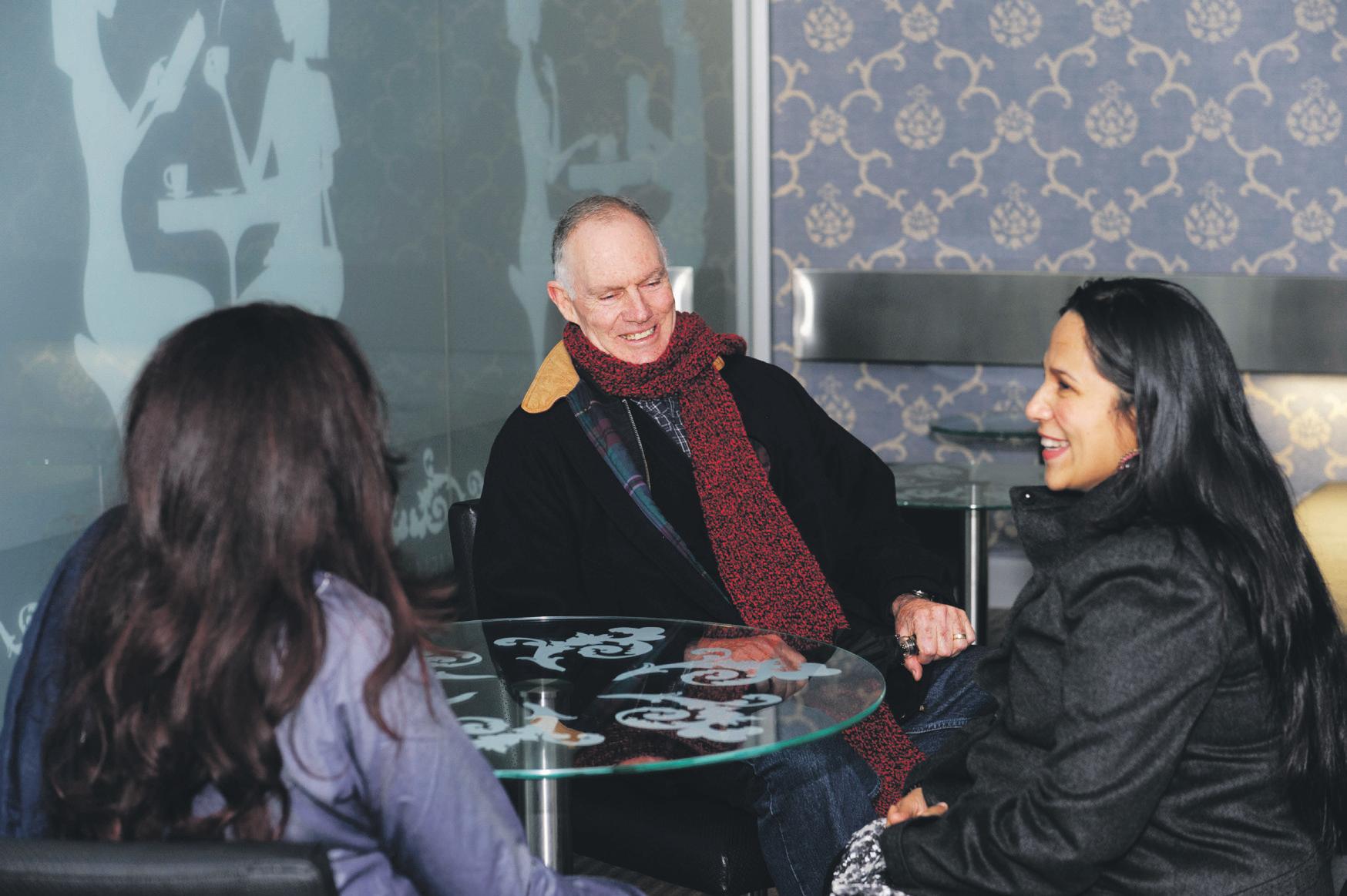
The Reluctant Fundamentalist was screened recently at Hoyts Melbourne Central as part of the Indian Film Festival in Melbourne. Australian cricketer Greg Chappell officially opened the film to a large crowd of cinelovers. He expressed his eagerness to watch the film and thanked IFFM organisers for choosing this latest offer from wonderfully accomplished director Mira Nair. Prior to the show Mitu
Lange from Mind Blowing Films took a few minutes to thank her friend Ayesha who helped influence her decision to include Pakistani films in the IFFM. “I was initially hesitant to include Pakistani films in an Indian festival; however Ayesha assured me that it will receive full support from the Pakistani community. This proved true at last year’s festival with the screening of Josh, and I am glad to see that this year as well, we have a strong presence from the Pakistani community, making this festival truly multicultural,” said Mitu.
Bhowmick Preeti JabbalA poignant cinematic rendition of the frightening aftermath of 9/11Chief Guest Greg Chappell with Mitu Bhowmick-Lange at the film’s screening
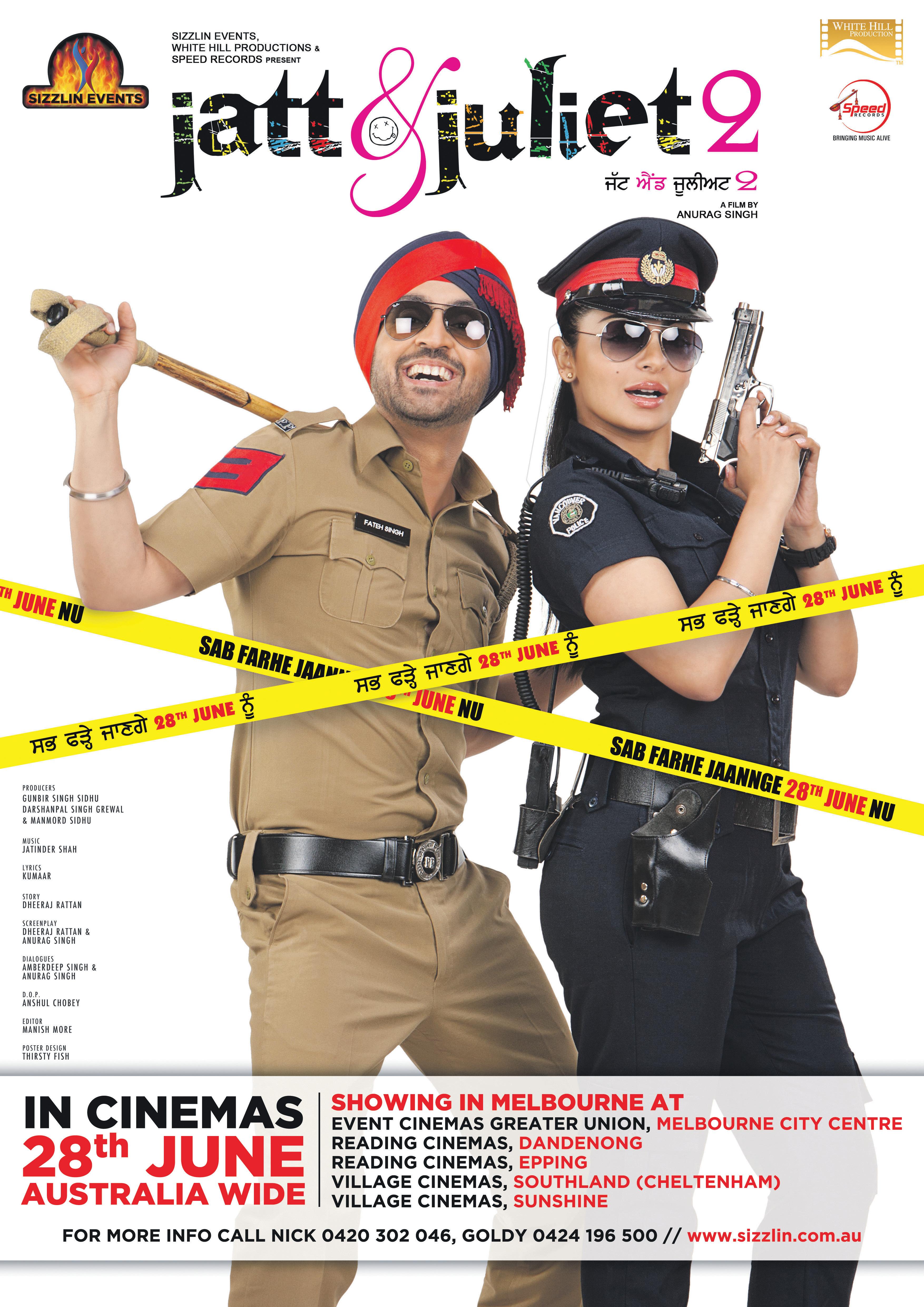
What Addison wished to do with this novel was to get the message across that the illicit sex trade is a worldwide phenomenon, limited not only to countries like India, but happening right under our very noses everywhere
BY CHITRA SUDARSHANIn June we cast our attention on two books, one nonfiction and the other a novel, that throw light on two very urgent humanitarian issues that animate India of the 21st century, all the hoopla about Indian economic growth and India becoming an ‘emergent power’ notwithstanding. The first is a book on Binayak Sen, a physician who had chosen to work with the tribals of Chattisgarh whose people, in the words of one activist, “have fallen off the collective conscience of the nation”. The second is a novel written by Corban Addison, that intends to draw our attention to the global sex trade, of which India is inexorably a part.
Chattisgarh may be in the throes of a Maoist rebellion, but most people in India’s malls and gated communities don’t spend time agonising over this. Dr Binayak Sen chose to work there and stand up for the rights of the very poor and dispossessed, which were
being trampled by the state. How does one begin to understand a man like Binayak Sen? What makes a man trained in medicine from Christian Medical College, Vellore, go and spend his life with the poorest. Tending to them and championing their cause when he could have worked in any of the best hospitals in the world and made a wad of money for himself?
Dilip D’Souza, the author of this biography of Sen, seeks to answer some of these questions.

D’Souza’s book charts Binayak Sen’s story beginning with his arrest in 2007, when he stood accused by the state and charged with sedition. Yes, sedition: the worst offence a citizen can be charged with. He was accused of being a go-between for a jailed Naxalite leader and a businessman, before being released in 2011.
D’Souza delves into news reports and other material to understand what motivates Sen, and cites instances of his constant engagement with issues as basic as malnutrition among the tribals. He contrasts this with the image of a doctor which the prosecution – the state – sought to create, which sought to challenge Sen’s credentials as a doctor in

an attempt to undermine him. In examining the case against Sen D’Souza is scathing in the book about the ‘evidence’ that was cooked up by the state, simply to bring the good doctor down. Sen spent more than a year in prison, part of it in solitary confinement, after which he was set free for ‘appallingly weak evidence’. This deeply sympathetic and moving account of a man of conscience who stood up to the powers that be and suffered enormously for it, is a ‘must read’ for all, especially the cashed up Indian diplomats and officials who hop from country to country touting India’s arrival as a ‘big power’. This is a much-needed corrective to all the recent selfcongratulatory articles and books that gloss over the deep challenges to India’s open-slather free market growth.
A Walk Across the Sun is a novel on the global trade in human trafficking, by author Corban Addison. In the summer of 2008, Addison embarked upon an odyssey that took him to India and Europe and into the corridors of power in Washington DC. In immersing himself in the world of modern-day slavery, he spent time with experts and

activists in the field and went undercover into the brothels of Mumbai to meet trafficking victims firsthand. Out of this journey, A Walk Across the Sun was born. It is a novel that brings together three of Addison’s great passions – storytelling, human rights, and the world’s cultures, in a narrative that enlightens while it entertains. Addison is a supporter of international justice causes, including the abolition of modern slavery, and this novel is his contribution to increasing awareness and doing something about it.
The novel is the story of Ahalya Ghai, a seventeen year old whose village is struck by the tsunami, leaving her and her sister Sita as the sole survivors of their family. With nothing to go on, their only hope is to find refuge in a convent in Chennai, many miles away. A driver agrees to take them, but the second they get into that car they are doomed – the two sisters are sold. Ahalya doesn’t quite understand why any man would pay so much money for them. She soon finds out.
On the other side of the world, in Washington DC, a lawyer, Thomas Clarke witnesses the kidnapping of a young girl.
Struggling to cope with the death of his baby daughter and the collapse of his marriage to Priya, he takes a sabbatical from his high-pressure job and accepts a position with the Bombay branch of CASE, the Coalition Against Sexual Exploitation. He is now on a path that not only involves saving himself and his marriage, but the lives of Ahalya and Sita Ghai.
A Walk Across The Sun is about cruelty and loss, about family and survival, and ultimately about love, and the immeasurable strength of the human spirit.
What Addison wished to do with this novel was to get the message across that the illicit sex trade is a worldwide phenomenon, limited not only to countries like India, but happening right under our very noses everywhere. As he pointed out in an interview, according to UN estimates, profits in illicit sex trade are upwards of $32 billion a year, just behind those in illegal drug and gun trades. His objective in writing this novel are to inspire his readers to learn more about the topic, to discover and support organisations that do “heroic work in this field,” and to “put pressure on people in positions of power,” who have the ability to do something to help girls caught in the vortex of the global sex trade.
Illicit sex trafficking in young children is not a pretty topic and this book may not be for everyone, but it is a real international concern and one that needs to be addressed openly. Addison has made a good start with this novel.
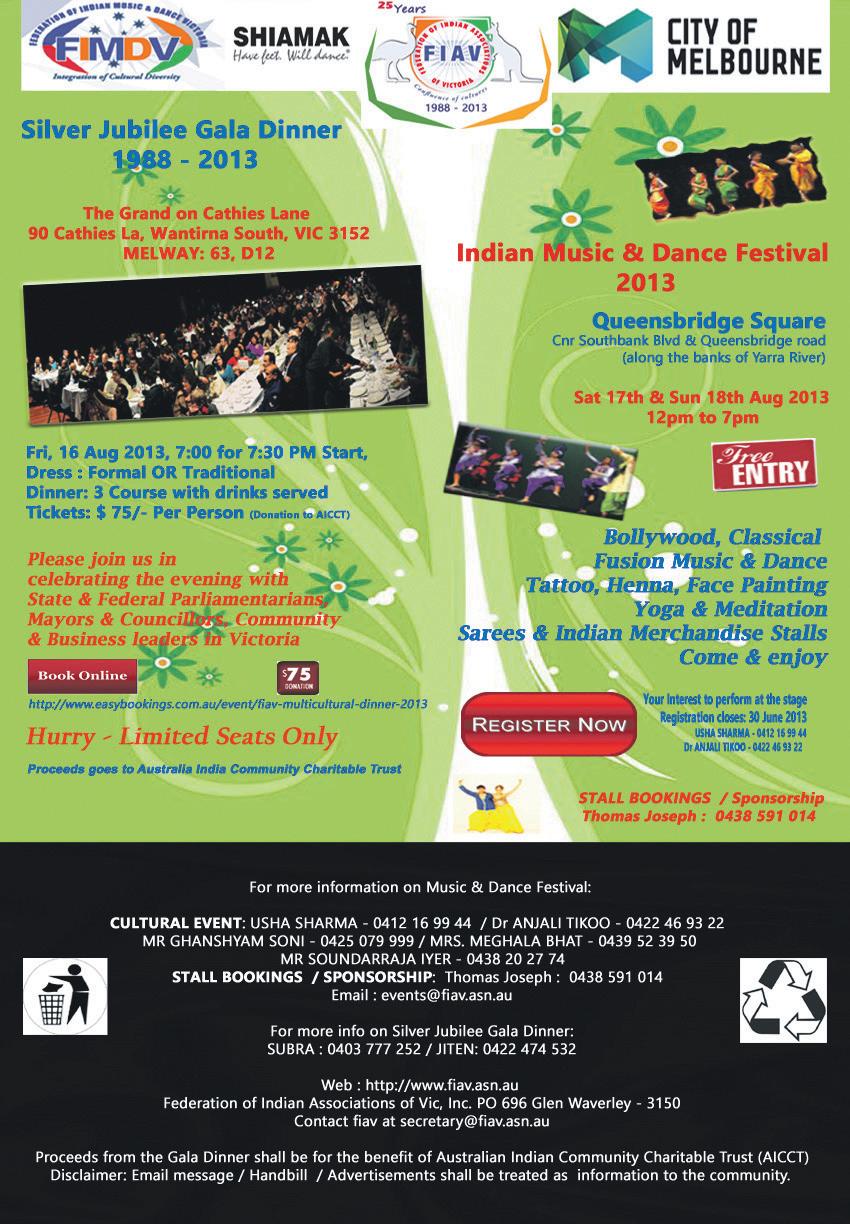

Lawrence White is one of the leading monetary economists in the world, having made notable contributions to the theory and practice of free banking, central bank policy and economic history.
In an article written a few years ago, White complains about the United States Federal Reserve System, arguing that it is violating the law and exceeding its statutory authority under the Federal Reserve Act
“Central bankers today are discretionary rulers over the economy’s monetary and financial institutions,” writes White. “Defenders of the rule of law, who in general decry the arbitrary rule of men, should specifically decry the rule of central bankers”.
For White, the American central bank’s unprecedented bailouts during the Global Financial Crisis should elicit outrage from across the political spectrum. The FRS has more than doubled its balance sheet, invested in assets that could expose taxpayers to large losses and has precipitated a significant increase in the monetary base that may lead to troublesome inflation.
Australians, meanwhile, have looked to their own Reserve Bank of Australia (RBA) with admiration rather than disgust,
and have even credited it with keeping Australia out of the economic panic that began in 2007. There is a strange indifference surrounding the question of whether the RBA adheres to the rule of law when it does things like fiddle with the cash rate or intervene in asset markets.
Perhaps it is time, however, to ask whether the RBA, like the FRS, could do better when it comes to acting consistently with the rule of law. Answering this question helps establish a red line in public policy debate. It says to anyone proposing a new idea using fancy economic reasoning that the idea must first pass the basic test of being compatible with the rule of law before being foisted upon Australians.
In 1873, Walter Bagehot wrote an intriguing book titled Lombard Street that explored the world of finance and banking and provided an eye-opening analysis of how financial crises should be managed. An important part of Bagehot’s contribution is the often quoted ‘Bagehot dictum,’ which states that in difficult economic times central banks should come to the rescue of firms facing a liquidity, as opposed to insolvency crisis. that is, central banks should save those firms that are otherwise solvent, but due to short-term factors have been placed in a tenuous position. And it should lend to them at a penalty rate.
Bagehot’s dictum is a rule of thumb that has been ignored by
central banks in the modern era. Central banks nowadays make politicised interventions in the marketplace, picking and choosing winners and losers without reference to a preannounced lender-of-last resort policy. It is this unchecked discretion in monetary policy that makes a mockery of the rule of law.
The RBS began its central banking operations in 1960. Central banking is primarily about influencing the money supply, and consequently influencing the level of inflation and unemployment in the economy. To carry out its objectives, the RBA has a board that exercises discretionary control over short-term interest rates in the overnight money market, i.e. the market for loans between financial intermediaries.
This short-term interest rate then affects other interest rates throughout the economy. Is the RBA acting consistently with the rule of law in targeting the overnight cash rate? If we interpret the rule of law as meaning adherence to a fixed Bagehot-style rule, then most certainly not, since there are few real checks on its meddling. Whereas, once central banks operated with reference to a gold standard that constrained their monetary interventions, the age of fiat paper money has significantly enhanced the RBA’s discretionary power to decide how much money to pump into the economy (bank officials retort that their inflation target of 2-3% limits their discretion, but holding it to
account is not as simple as it might initially seem given varying measures of underlying inflation).
A consequence of the absence of a monetary rule has been the creation of uncertainty among private actors. Market participants trying to factor RBA policy into their business plans are faced with a daunting task in the absence of an easily ascertainable method of predicting which way the winds will shift the cash rate any given month. This state of affairs is the essence of the ‘rule of men,’ where observers hang onto the words of a group of bureaucrats, and is the antithesis of the ‘rule of law,’ where stable guidelines of general application are promulgated.
With 37 years of experience inherited through family with reputation of helping people all over the world.
therefore I strongly believe that I can solve your problems in the quickest way. Are you suffering from influence, blockage, unknown diseases or unhappy situations that you cannot get out of it. If so, then do not hesitate to contact me Mr Habib who can solve all of your problems within 7 nights especially Sexual problems, or Bad luck Business matters, exams, Court cases, Unhappy marriages or Relationship problem and many more.

100% guaranteed service work. By correspondence also available.
Call now on 0413 796 391 or 0470 641 395.
We are a professional Indian family with 2 kids (10 years and 8 years). We have up to two bedrooms available in our luxurious house for rent / boarding for a suitable single (female preferred).
• Room is furnished upstairs bedroom with bed, mattress, desk, chair, dresser
• Room has attached private toilet / shower / washbasin
• Room has attached spacious walk-in-wardrobe and storage area
• We will allow shared use of kitchen, fridge, washing machine, TV, DVD
• House is close to park, shopping centre, bus stop
• Room has heating and cooling
• Food (vegetarian and non-vegetarian) will be provided
• Rent $750 per month including food and reasonable use of electricity, gas, water
if interested, call or leave message on: 0423 001 508


has not yet been able to express his feelings. He wants to give her all the happiness in the world.
bakwaas, time-pass or sheer escapism, Bollywood has an inexplicable influence on our lives. We laugh at films like Golmaal , and are profoundly stirred by films such
Taare Zameen
Zindagi Na Milegi Dobara We imitate the fashions, travel the same spots, and adopt the wooing or dancing styles of the stars. We have our favourites or pet loves, and often life-long single-sided internal love affairs with some of the most glamorous stars. And don’t deny it, most of us have our own Bollywood fillum that we have come up with, inside our heads!
As a homage to the centenary of the Hindi film industry, I came up with an idea to develop a Bollywood film on air, with contributions from the listeners. In a concept created along with Neelam Vasudevan, Indian Link Radio’s Program Director, we set up a backdrop, and then gave the
Simran is a simple girl who, like every girl, wants to be loved. However she is attracted towards the caring nature of Raj and has a special place in her heart for Raj.
Raj is a simple-living-highthinking type of person with strong values and beliefs. He’s a great guy with a charming personality. He too has a soft spot for Simran.

Sameer Mehrotra: Vijay gets into gambling to make fast money and even spends his university fees to fund his habit. As fate would have it, Vijay loses his money and gets into heavy debt. Raj and Simran don’t know this reality. They think Vijay is doing well financially and are proud of him.
Harmeet Hora: One fine evening all three party it out at shimmering Darling Harbour. Over drinks at the nightclub, Simran spills her wish to live the luxurious life one day, to be able to travel first class and to exotic locations. After a few drinks down Vijay in his emotional outburst shows his inclination towards Simran but she is not able to identify.
However Raj understands it all
Harmeet Hora: Vijay books two business class tickets and a holiday package at a grand resort in Singapore to show Simran a good time. He uses the advance money given to him by the baddies. He plans to smuggle the drugs packet through Simran’s hand baggage as he assumes it would be easier for her to get through security.

Harmeet Hora & Sagar
Mehrotra: As luck would have it, Simran is caught at customs and is put behind bars. This came as a jolt for Vijay as this was not the part of the plan! The baddies are waiting around menacingly to get their shipment. Vijay is devastated and at this moment he realises what he has lost. He has lost his love and the trust of a good friend, as well as respect and money. He is financially and emotionally broke!
He discloses everything to Raj. Raj explains to him that there is no shortcut to success and asks him to surrender himself to police.
Raj and Vijay are on their way to police station. But they are confronted by the bad guys to who
However Raj sees him doing that. He is devastated that his friend is involved in illegal activities and using Simran; he thought Vijay loved Simran!
Punita Udeshi: Raj acts fast and cleverly records everything on his smartphone. When Simran is caught red handed, Raj comes in for her rescue and reveals the truth. Vijay is held by the cops. Simran comes to know the actual Vijay. Raj and Simran live happily ever after...
The story line all settled, we called for on-air auditions for our lead roles. Caller Shreeram auditioned successfully for the role of Vijay; caller Prabhjot for the role of Raj, and caller Rashmi for the role of Rashmi.
In a special cameo, caller Gopal impressed with his audition for the role of Simran’s father (presented in Paresh Rawal style)!
There were contributions by our listeners through Indian Link Radio Facebook page and phone at various stages during the story was built as below:
Janaki Bhatia: Vijay ko cancer ho jata hai, first stage. Raj comes to know, but not Simran.

Manu Puri: Classic tale of Dostana-style love i.e. Vijay is falling for Simran, Simran for Raj, but Raj is falling for Vijay.
A sure film in 200 crore business club!
statement, police is able to crack a big drug racket. All charges against Simran to the airport. Vijay plants
Prabhjot Virk: Raj has passports of both Vijay ands Simran as he escorts them to airport. He sights Vijay planting drugs in Simran’s handbag. Instead of confronting, he says “Guys, I am sorry, I’ve forgotten your passports at home”. That cancels their trip and Simran is saved.

Produced by Indian Link Radio Concept: Neelam Vasudevan
Directed and Narrated by Sagar Mehrotra

As a homage to the centenary of the Hindi film industry, I came up with an idea to develop a Bollywood film on air, with contributions from the listeners
There’s no way I can give Simran the life she wants, he feels, and so decides to sacrifice his love for Simran
Fat free and low in kilojoules, this sweet fruit has more than twice the recommended daily requirement of vitamin C
Did you know that there are two types of papaya?
Red and yellow. Well, now you do. One isn’t just a little bit more ripe than the other. And how do you tell which is which? Well, it’s simple. Red papaya is the sweet, pear shaped one, with orange-red flesh and a yellow-orange coloured skin, whereas the yellow variety is a bit bigger and rounder, with yellow flesh and pale orange skin. And right now in May (and then again in September and October) is their peak season.
And how to tell when they’re ripe? They’re a bit like avocados or pears, they’ll yield to pressure around the stem. And remember, you’ll have to be extremely careful with them to avoid bruising. Store them in the fridge if you aren’t going to eat immediately.
“Red papaya and yellow papaya are perfect ingredients in a variety of recipes,” MasterChef Series
Two contestant, Alvin Quah says. “Their sweet tropical flesh works beautifully in desserts and cakes, but they’re equally lovely in savoury dishes. They add colour and flavour to fresh salads and, due to an enzyme they contain, they can be used to tenderise meats such as chicken and pork”.
Fat free and low in kilojoules, papayas contain a wide variety of vitamins and minerals. Just 150g provides more than twice the recommended daily requirement of vitamin C, as well as vitamin A, calcium, iron, carbohydrates and a wealth of protective antioxidant carotenoids. Now that’s a whole lot of goodness!
Lemongrass chicken with papaya and cucumber salad
Serves 4
Prep: 15 mins
Cooking: 10 mins
Ingredients
4 (about 150g each) chicken breast fillets
1 stem lemongrass, pale section only, finely chopped
2 tsps peanut oil
1 tbsp fresh lime juice
2 tsps fish sauce
2 tsps brown or palm sugar
½ tsp sesame oil
1/2 papaya, deseeded, peeled, very
thinly sliced
2 Lebanese cucumbers, end trimmed, thinly sliced lengthways into ribbons
½ cup round mint leaves
½ cup Thai basil leaves
1/3 cup toasted peanuts, coarsely chopped
Steamed Jasmine rice, to serve

Method
1. Preheat oven to 180°C. Place the chicken and lemon grass in a large bowl.
Drizzle with oil and gently toss to combine. Season with salt and pepper.
2. Heat a large frying pan over medium-high heat. Cook chicken for 2 mins each side or until golden. Transfer to an oven tray and bake for 8 mins or until just cooked through. Remove from heat and set aside for 5 mins to rest.
3. Meanwhile, combine the lime juice, fish sauce, sugar and sesame oil in a small bowl. Place the papaya, cucumber, mint and basil in a large bowl. Drizzle with dressing and gently toss to combine. Divide evenly among serving plates.
4. Thickly slice chicken and place on serving plates. Sprinkle with peanuts and serve immediately, with steamed rice, if desired.
Tips: For a summery change, use salmon fillets or tuna steaks instead of the chicken. Cook salmon or tuna on a chargrill, 2-3 minutes each side for salmon; 1 minute each side for tuna.

Serves 4
Prep: 15 mins
Cooking: 5 mins
Ingredients
2 bunches asparagus, woody ends trimmed, diagonally sliced into 5cm lengths
2 baby fennel, ends trimmed, fronds reserved
½ papaya, deseeded, peeled, thinly sliced
100g baby rocket leaves
2 x 125g portions hot smoked
salmon, coarsely flaked
1 lemon, zested, juiced
¼ cup (60ml) olive oil
2 tsps Dijon mustard
2 tbsps finely chopped chives
Method
1. Cook asparagus in a large saucepan of salted boiling water for 2 mins or until bright green and tender crisp. Refresh under cold running water. Drain well. Place in a large bowl.
2. Use a vegetable peeler or mandolin to thinly slice fennel lengthways. Add to asparagus with papaya, rocket, salmon and lemon zest.
3. Combine lemon juice, oil, mustard and chives in a screwtop jar and shake until well combined. Taste and season with salt and pepper. Drizzle over papaya mixture and gently toss to combine. Divide among serving plates and sprinkle with reserved fennel fronds. Serve immediately.
Tip: The hot smoked salmon can easily be replaced with barbecued fresh salmon or chicken breast fillets.

Serves 6-8
Prep: 15 mins
Cooking: 1 hr
Ingredients
2 cups (300g) self-raising flour
1 cup (200g) brown sugar
1 tsp baking powder
½ cup (125ml) mashed papaya
½ cup (125ml) mashed banana
2 eggs, lightly whisked
150g butter, melted, cooled
½ cup (70g) toasted macadamias, coarsely chopped
½ cup finely chopped papaya
Honeycomb butter: 100g butter, softened
30g honeycomb, coarsely chopped
Method
1. Preheat oven to 180°C. Grease and line the base and sides of a 8 x 24cm (base measurement) loaf pan.
2. Combine the flour, sugar and baking powder in a large bowl.
3. Combine mashed papaya, banana and eggs in a small bowl. Add to the flour mixture with the melted butter, macadamias and extra papaya and gently stir until just combined. Spoon into the prepared pan and smooth the surface with the back of a spoon. Place on an oven tray and bake for 1 hour or until a skewer inserted in the centre comes out clean.
10 mins before turning onto a wire rack to cool.
4. Meanwhile, to make honeycomb butter, use an electric mixer to beat butter until pale. Add honeycomb and stir to combine.
and dollop with honeycomb butter. Serve warm or at room temperature.
Recipes courtesy of: Sarah Hobbs www.australianpapaya.com.au
Well settled parents looking for suitable match for their 32-year-old daughter, who works for a multinational company in Sydney in a senior corporate position. Pretty, beautiful, 163cm tall, brought up in, and values both Indian and western culture. Seeking Hindu professional man, preferably from a well settled family background. Please contact: sur6958@gmail.com or mobile: 0404 147 744.
Seeking suitable match (from Australia, never married) for Hindu girl 35 years old, chartered accountant (non-veg), living in Australia over 25 years, with eastern and western family values. Please email: ganesh2011v@gmail.com
Match wanted for 42-year-old highly established, tall, slim, very pretty and smart doctor. Looks around 20-25 years of age and belongs to a highly educated and affluent family. Divorcee but marriage was nonconsummated. Please contact: ladoctoroz@gmail.com
Well settled parents looking for suitable match for their 30-year-old daughter working as a clinical psychologist in Sydney hospital. Pretty, beautiful 165cm tall, brought up in and values both Indian and western culture. Hindu professional man from well settled family background
preferred. Please contact: fame46213@gmail.com or: 0452 227 920.
Suitable match for beautiful slim, Jatt Sikh. Born on 22nd October, 1987. Height: 5’, 3”. Graduated from P.U Chandigarh. Is in final year of studying interior design. Belongs to well settled family. Living in Mohali. Looking for a clean shaven, permanent resident/ citizen of Australia. Please contact: ravinder_perry2007@yahoo.com.au
or: 0434 331 143 (Australia)
or + 91 987 201 0496 (India).

Respectable Punjabi Khatri family of New Delhi seeks alliance for their smart good looking sweet natured family oriented dentist daughter pursuing M.D.S(Pedo), 28/159cms, looking for a boy from a cultured family, well settled in same profession. Email: drsobti1984@gmail.com

Seeking groom for Hindu Punjabi 30-yearsold, 5’1”, Australian citizen, well qualified, fair, charming, family oriented, responsible girl in Sydney. Brought up in India. Well settled, qualified, professional suitable matrimony match required. Caste no bar. Previous marriage annulled. Contact: +614 062 82 784 or: Lifepartner145@yahoo.com.au
Suitable qualified match for beautiful Ramgharia Sikh girl 32-years-old, 5-3’ divorced after brief marriage, issueless. Aus citizen. MBA (HR-Commerce) presently working in good
position at bank in Sydney. God fearing and cultured family. Girl’s parents visiting Australia in June. Local phone: 0412 254 015 or ranveer.singh787@gmail.com
Gursikh, khatri, Doctor/engineer/PQ match in Australia, for 5’6” Nov.90 born, very beautiful girl having OCI, convent educated in Delhi, software engineer in Australia. Only well settled and educated family based in Delhi should email profile, and photos to: sr_imex@yahoo.com.au
Parents seeking match for fair, slim Hindu Khatri girl, 26 years, CPA Australia, working as an accountant in Sydney. Born and brought up in Kenya in a loving family with high moral values, our daughter is now an Australian Citizen with a double degree (Accounting and Applied Finance) from MQ University. We are a small, tight knit, professional family and are looking for a well educated, family oriented boy who is willing to settle in Australia. Please email proposal with education, job details and recent photo to rits.bahal@gmail.com
SeeKING BrIDeS
Seeking bride for a 27-year-old well settled Catholic gentlemen 5’6”, permanent resident, studied Electronics Engineering and working in a steady job as a technology officer earning a good salary.
Living in Canberra. Please email: catholic_guy_1985@outlook.com
I am a 50-year-old Hindu , 5’4’’, Australian citizen, never married, and issueless. I am looking for a lady to share life with. Contact Arun: arun9tiku@yahoo.com.au or 0470 626 483.
Bangalorean gentleman 43-years-old, born in Coorg, India. Sincere / God fearing. Alliance for genuine girlfriend aged 27-45 yrs, possibly early marriage, student, tourist, PR ladies interested. Please call Mr Davha for appointment on: 02 9676 2512 or: 0458 153 193.
Seeking match for highly educated, nevermarried, 5’ 9”, 1975 born Sikh Khatri boy. Full-time permanent job with decent income in customer service role. Looking for well-educated, never married Sikh girl from Australia. Early marriage. Phone: 0422 102 242 or email: jas_ghai01@hotmail.com
Shastry is an expert in Palm, Face, Photo Reading, Numerology & Predicts your Past, Present & Future. Performs Home Shanti Pujas, Sudarshana Chakras, Laxmi Chakras, Vastu Consultation - Home &











The month is off to a sizzling start with love, romance and togetherness on your mind. You will feel more settled in your work life, with great news relating to a transaction or idea that you have been working on for some time. There will be difficult situations with people in authority, so take care and don’t get over stressed. Make sure your paperwork is in order. It is time to seriously look after your teeth, have a check up.
You will be thinking about making more money, but be careful not to invest in stocks and shares, you may not make as much as you think. You may book a holiday as you have not been away for some time. You may bump into someone you have not met for some time. The meeting will be really pleasant and fun. There may be some issues with your lower back this month. Take care and have it seen to.
You will be feeling very passionate and loving this month, and your partner will be feeling very loved and appreciated. If you are single, you will want to find a loving partner. Work will be hectic and demanding, but there are good opportunities to gain promotion and more money. You will think of getting your hair styled differently. You will be feeling very energetic and adventurous. Watch out world, here you come!

Make sure you get a lot of rest, as you will be feeling irritable and restless. There will be interesting developments at work, you may have to eat humble pie if things get tense with colleagues.Finances may be tight, so curb spending. The cards show that you may be looking to buy a new vehicle. Take your time to decide if it is feasible right now. Make sure you get plenty of exercise.
This month will be about work and gaining more projects and contacts. You will look at taking your business overseas as much as possible. relationships will be strained and you may not be enjoying family life. There will be difficult situations with elderly family members. You are feeling a bit restless and overwhelmed. Make sure you take care of your bones this month, the cards indicate some pain around your knee area.



VIrGo Aug 23 - sep 22
You will be in the mood to get things organised and change a lot around you. It’s time to spring clean around the house and de-clutter, letting go of unwanted items. Your energy levels will be a little low at times, so make sure you are drinking enough liquids. A relative may not feel too well, but don’t stress out and things will be fine. Take time to relax your nerves, as there is anxiety and stress around you.
The month starts off very slowly. You are result orientated, with great ambitions to progress further. You will be stressed out with work and burdened with family commitments. You may argue with your spouse, so take time out to speak to them. You will spend time with friends to de-stress, but your family may not be happy about this. The cards indicate a time of highs and lows, fresh air will clear your head.
The month will be difficult to start with, as you are confused about work, as you are bored and not in the mood. Try and look for another job or position in this company. If in your own business, try to bring in more business and clients. There will be a tendency to lose your temper, so keep cool and relax. There will be good news relating to property that will cheer you up. Balance is needed.
June will be a turning point, a make or break month. You will feel like you are getting nowhere fast. Work is busy and keeps you very occupied, with not much time for you or your family. There may be plans for another child. If single, you may think of getting engaged. There will be brilliant news about a loan application. The cards indicate a time to give to the less fortunate.
You will be making plans to bring in some extra income. Work will be slow, but things should look up mid-month. Some people will try to test your patience with their criticism and questions. There will be new projects coming your way but you need to look into them carefully, as you have a tendency to rush into things. The cards are indicating a time to meditate and undergo yoga sessions.
AqUArIUs Jan 20 - feb 18
You will be feeling pretty good this month. Work will be challenging, but you will maintain a good home/work balance. reignite the flames of love and passion by taking your partner on a surprise trip. A friend may need you, as there will be some unsettling factors around them. Do not use harsh words with people, as you may upset important friends and colleagues. relax and rest, June will be power-packed.
pIscEs feb 19 - March 20
June is a good month to make travel plans and get away. You may start a new venture or begin studying in an evening class. Your social life is not too busy, you want to make new friends and meet new people. You will look for new work, and/or plan to move to a different city in the future. Family may be bossy, telling you what to do. The cards indicate a time to celebrate inner peace and happiness.
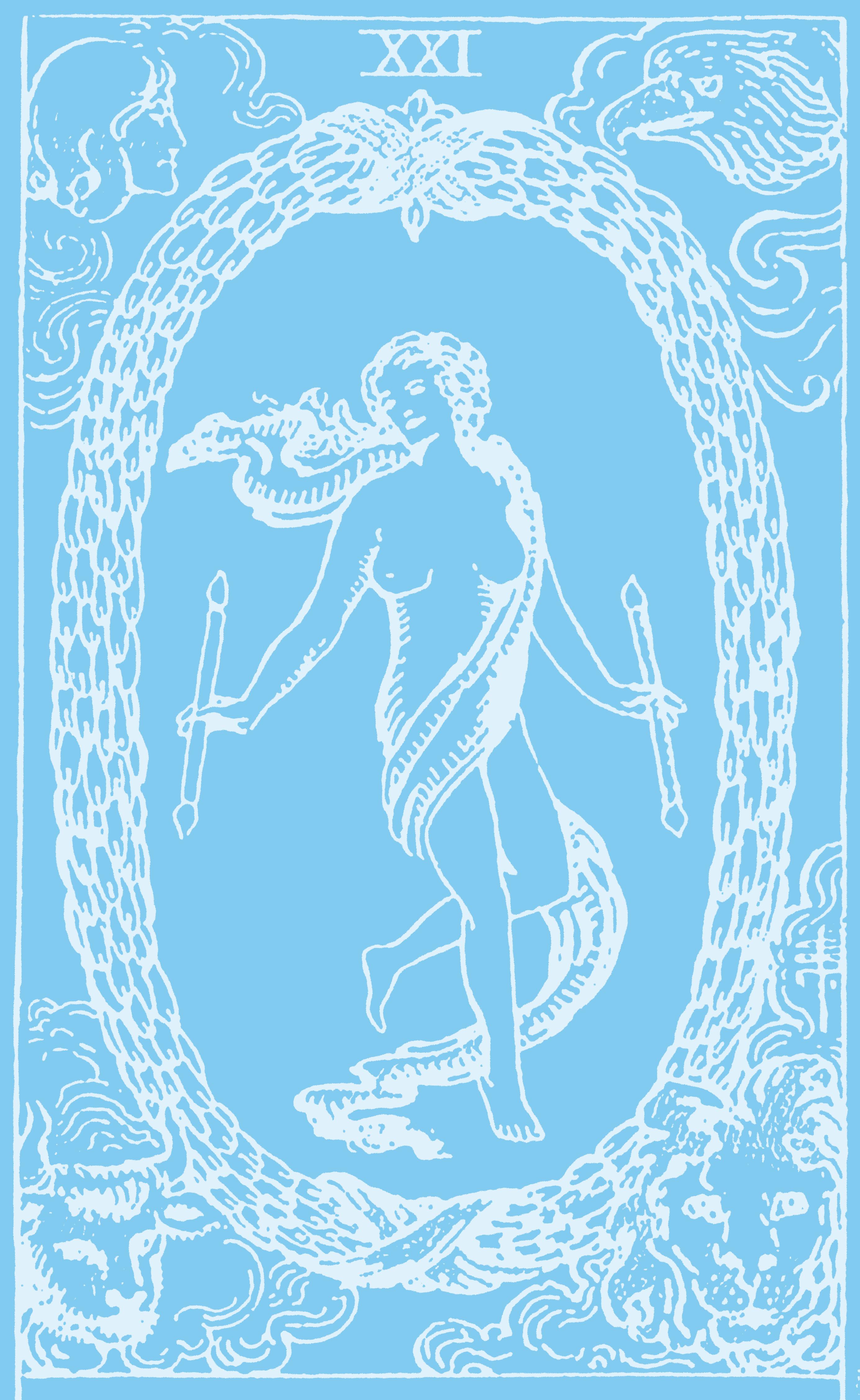



STArrING: Preity Zinta, Rhehan Malliek and Isabelle Adjani
DIreCTOr: Prem Raj HHHH
Love, as the sages say, is a manysplendoured thing. You can look at it as an occasion for stress and heartbreak (which is why we fall, never rise, in love). Or love can be a celebration of life.
Director Prem Raj’s debut film Main Aur Mrs Khanna took a quaint capricious look at love during times of adultery. On this occasion (Ishkq In Paris) he takes flight in a Parisian paradise where two strangers, both single, attractive and commitphobic, spend the night together.

No, it’s not doing what you’re thinking in your dirty mind. They roam the cobbled, mysterious, pleasurable lanes of Paris in pursuit of a good time and then decide “never” to meet again.
If you’ve seen how Kareena Kapoor affects the sober, staid and repressed Shahid Kapoor in Jab We Met, you’d know that feminine exuberance is a hard aphrodisiac to resist, specially if you are a closet-romantic like Akaash (Rhehan Maliek), who in no time at all (the first five minutes of this crisp and delightful slice of love-life comedy) is eating out of Ishkq’s lovely hands.
Ah, Ishqk! She is that kind of a girl. Half-French and fully desi, Ishqk fills up the frames with an unbridled joie de vivre I can’t think of a role better written for Preity Zinta. Missing from the screen for a couple of years, she bounces back with a performance that derives its zing and sparkle from the actress’ inbuilt zest for life.
Preity takes her character Ishqk beyond her own personality. From Frame one we see Ishkq as a girl trapped in selfdeceptions that leave her unnecessarily wary of relationships. Ishkq hides her real emotions in romantic nonchalance. This is not the first time Preity plays a repressed character. In Nikhil Advani’s Kal Ho Naa Ho, Preity had to make a ‘spectacle’ of her character Naina to bring out her commitment phobia in the absence of a father, who abandoned her when she was young.
Here, in this Parisian homage to all things romantic, Preity’s character blossoms before us without props and yet looks immensely fetching. It is a nonaccessoried performance, very basic and
liberated from humbug.
Preity brings out the highs and lows in her emotionally awash character without taking flamboyant leaps of on-camera conceit. It’s a beautifully written and directed part, replete with restrained resonances that give the actress a chance to show her skills in subtle ways.
Rhehan as Preity’s ‘other’ gives the actress just the right cues. Confident and yet not cocky, Rhehan seems poised for a satisfactory innings in Hindi films.
Looking at how well Rhehan partners the screen-filling Preity on the screen, one wonders if this big-hearted romanticcomedy would have worked with any other two actors! These two may not be mad for each other (at least, not until we leave them at the end of the film). But by Cupid, they are definitely made for each other!
Prem Raj allows the couple plenty of space to let their feelings breathe freely and easily into the narration. The two protagonists may be in a hurry to get somewhere, but the film isn’t.
The exquisite camerawork by Manush Nandan sweeps languorously through the neon-lit seductive night-life of Paris and the daytime bustle of the streetside cafes without getting into touristic awe.
One shot where Preity treats Rhehan to the wondrous sight of all the lights coming alive in the Eiffel Tower stays with you. If only love could be captured and frozen in its most majestic manifestations!
Interestingly, the narration is fashioned like a fable, with the legendary French actress Isabelle Adjani telling us about Ishkq’s brief encounter with Akaash and its aftermath, without letting us in to her own role in the romance. It’s a cute little secret kept away from us for a while in a film where the main protagonists play out their emotions in full view and with disarming transparency.
Preity, Paris and Prem Raj whip up a
souffle romance. Fresh, frothy, feel good and, yes, look good, and with a solid undercurrent of emotional frisson to guide the love story to its heart-warming culmination, Ishkq In Paris makes you thankful for that thing called love. The tone of narration is umistakably European.
Welcome back, Preity. And yes, bon appetite to all moviegoers. Go, tuck in.
SUBHASH K. JHADaily
Films about Indian cinema’s legendary personalities are still a rarity. And one of those rare attempts is being made by Deepti Naval - she is keenly interested in making a non-fictional film on the life and times of that amazingly naturalistic actor Balraj Sahni, but has been facing certain problems.

Deepti, who is aesthetically motivated by Balraj Sahni’s effortless performances, has been researching his life for years. Just when she was ready to put all her research material on screen for the immortal actor’s birth centenary this month, a hurdle has placed in Deepti’s plans by Balraj Sahni’s son Parikshat Sahni.
Explains Deepti, “I was really keen on making a film on Balraj Sahni. But when I approached his son Parikshat for his consent, he told me he had already given the filming rights on his father’s life to another producer. He didn’t think it was right for me to do a film when someone else is committed to do the same. I agree. But we’re trying to find a solution to the deadlock, because I’m really keen to do this.”
Years ago, Simi Garewal made a documentary called ‘Living Legend Raj Kapoor’ and Sandip Ray did one on Kishore Kumar.
Deepti, who was recently seen in a minuscule role in Yash Raj Films’ Aurangzeb, says some of her important scenes have been cut from the film. “But I have no regrets. I did it because of my regards for Mr Yash Chopra. He was always very sweet and kind to me,” said the actress of films like Saath Saath and Chashme Buddoor
We love you Vidya Balan, but did you make us cringe at Cannes!
Surely you, the most cerebral of Bollywood’s women, should have known better.
The demure chunni over the head, when you’re supposed to be holding your head high? An outlandish lehnga that makes you look positively medieval? What were you thinking?
And Big B - who advised you on that ridiculous street-band-wallah outfit, when all your contemporaries were dressed in smart jackets? And those white shoes with navy trims, were they left-overs from the sets of The Great Gatsby?

Sonam Kapoor, you made our eyes pop out with that absurd nose thing, and we had to look closely at

your outfit to make sense of what it was: sari with a jacket that trails on the carpet? Other than that, your look can best be described as a make-up malfunction: it was as if the photographer caught you mid-way through your make-up for a traditional dance recital.
Overall, you looked quite the nautanki at Cannes this year, Bollywood. Literally. It was like you were dressed for a fancy dress party. National dress and all that is understandable, but this is preposterous.



This might be a bit harsh, but if you’re craving broader recognition at the international stage, Bollywood, it’s going to take longer for them to warm to you if you insist on appearing so insular.
The actress says mainstream cinema has always had a problem positioning her. “That’s why I keep running back to the more realistic cinema. It’s okay to do a small role in mainstream cinema like Aurangzeb or Yaariyan. But its films like Rituparno Ghosh’s Memories Of March and Avinash Kumar Singh’s Listen, Amaya that sustain me as an actress,” said Deepti. She is now looking forward to the release of Shekhar Suman’s Heartless “Heartless is a rare commercial film where I have a substantial role,” she added. Watch this space for more news on Deepti’s busy life!
Mithun makes Mahaakshay nervous!
Veteran actor Mithun Chakraborty’s presence on the sets of forthcoming film Enemmy is certainly making one actor pretty jumpy. And that’s none other that Mithun’s son Mahaakshay Chakraborty, who candidly admits that worming with his dad was a ‘nerve-wracking’ experience for him. Directed by Ashu Trikha, Enemmy is a cop action drama, which features Mithun and actor Suneil Shetty in lead roles, while Mahaakshay plays a CID officer in the film. “For me, it was a nerve-wracking experience,” said
Mahaakshay, but didn’t seem keen to elaborate. However, Mithun didn’t have any such qualms and said he was happy to work with his son. “He is growing as an actor, and I want him to grow...that’s the way,” Mithun said.
Mahaakshay made his acting debut as Mimoh with the film Jimmy in 2008 and later he was seen in the films like Haunted 3D and Loot. But he still hasn’t got a strong foothold in the industry.
Mithun wants his son to carve his own niche. “You have to fight your own battle. I am not one of those fathers who always goes on blessing and praising, that ‘yes, everything is good’,” he added.
Enemmy also features Kay Kay Menon, Mahesh Manjrekar and Yuvika Chaudhary. Now all we can hope is that Mahaakshay doesn’t think of Mithun as his enemy!
While things seem to be quiet on the Katrina front, the star’s sister seems to be making slow and stead progress on the film scene. Isabel Kaif has been signed to play the second lead opposite British Indian actor Kunal Nayyar in French director Jean-Francois Pouliot’s Dr. Cabbie
The film, co-produced by Salman Khan, features Vinay Virmani, who played one of the title roles in Bejoy Nambiar’s undervalued David
And it’s not surprising that Salman is taking more than a casual interest in the film fortunes of this young star. An informed source claims that Salman wanted to cast Isabel opposite Vinay in the first lead, but by the time the decision was taken to cast her, it was too late.
“The G.I. Joe actress Adriane Palicki had already been signed opposite Vinay. So Isabel stepped in to co-star with the film’s second lead Kunal Nayyar, who has worked in the hit American series The Big Bang Theory,” said the source.
Sources from Canada, where the film is being shot, say co-producer Salman is taking a keen interest in the project and in Isabel’s role. And leading man Vinay said,
“Isabel has joined our project. She’s a really sweet girl, very easy-going and fun to work with.”
So when will Isabel venture into Bollywood, in the steps of her big sis? Apparently in 2014 in a film that may be jointly co-produced by Salman and Katrina, says the buzz. Well, at least its some consolation for Kat’s fans who’ve been missing her screen presence for a while now!


His elder brother is associated with a film production banner, while his younger brother is a video jockeyturned-actor. Director-actor Kunaal Roy Kapur feels even though they are not really a film family, but they have ended up being one.

They entered filmdom via different routes - elder brother Siddharth Roy Kapur is the managing director, Studios, Disney UTV, while their younger brother Aditya is now an actor, last seen in the film Aashiqui 2
“I wouldn’t call us a film family. We have followed different routes into the film world. My brother Siddharth came from the corporate world and
had his own route into the film world. I came through theatre and TV, and Aditya as a VJ. We aren’t really born into a film family,” Kunaal said recently in an interview. Kunaal, who has acted in films like Delhi Belly and Nautanki Saala revealed that his grandfather came to the Maximum City to make films, but didn’t enjoy much success. “Our grandfather came here to make films. He made some films, but failed miserably at it. We have never been a film family in that sense. My dad was in the army and my mother was a dance teacher. We have now ended up becoming a film family, which is wonderful and strange also,” he said. Before facing the camera, Kunaal went behind the lens to direct The President Is Coming, a satirical mockumentary. He feels that “it takes a certain amount of political and social awareness to be able to enjoy satire”.
“You have to be aware of the social climate at that time. It works in context to what is happening in the society. For people who are aware, it is a great form of entertainment as it is sourcing from what is there,” he said and added that humour presented in any form works.
“We have always had different kind of comedies. We have had Amol Palekar to Johnny Lever. All sorts of humour works. I don’t want to disrespect any humour
as you can’t tell people what to laugh at and what not to.
“You can’t be so presumptuous and snobbish about humour. Humour is subjective and everyone is free to laugh at whatever they find funny,” he said. For Kunaal, other than box office returns, the process of making the film also needs to be fun. “When you are having fun working, half the battle is won. It’s not a chore anymore. Your success lies in enjoying your time. The box office is one thing, the success of a film also lies in the process of making it. For me, it was a great joy making Nautanki Saala and I would do it again,” he said. Well, lets hope you get the chance, Kunaal!
Three of Bollywood’s famous KhansShah Rukh, Salman and Aamir - have already had a taste of the small screen, but Saif Ali Khan is happy being distant from it. Neither does he enjoy the drama content, nor does he find any entertainment in reality TV.
“I don’t know about acting on TV. I feel we need great content on TV. As of now, it is cornered by housewives, and I feel there’s a need for content for young boys. Our TV is not as good,” Saif said in an interview recently. As a viewer, he enjoys watching TV, and believes it shouldn’t be called an ‘idiot box’.
“I like to watch a few episodes of British and American shows once in a while, and one has to admit that the quality of some of their shows is as good as movies somehow,” he added.
Saif, who was recently seen in his home production Go Goa Gone, says nono to Indian TV reality shows as well.

“I can’t bear reality TV. Why would I want to watch all of that? I don’t like shows like Big Brother. I like drama,” he
Share your views with us on our Facebook page
While Saif has kept away from the small screen, his veteran actress mother Sharmila Tagore has earlier judged music reality show Dhoom Macha De, and actress sister Soha Ali Khan has hosted Khelo Jeeto Jiyo. So Saif, it looks like it could be Kareena’s or your turn next!
What’s the chitchat between Amitabh Bachchan and Vidya Balan? Send in your responses to win@indianlink.com.au and win a surprise prize

What’s Soha Ali Khan’s special message to her mum on Mother’s Day?

“Thanks Mum, for agreeing to star in a movie with me. With your star power, and my good looks, it will surely be a hit. So any takers out there for a Sharmila-Soha film?”
Siddharth Kulkarni Indooroopilly QLD
Siddharth wins a ticket to new Hindi film release Yeh Jawaani Hai Deewani

Dear Auntyji
I was hoping you could enlighten me. Auntyji, my wife who I love very much from the bottom of my heart to the bottom of my feet is a bit angry with me and I don’t really know why. Last month, it was her 40th birthday. Now, my wife does not like surprises, in fact, she hates them; but because this was a major milestone, I thought I would surprise her with a party for family and friends. I planned it to the last detail and had so much fun doing it. Everyone was sworn to secrecy and even though some of my friends asked me if Anita would like the surprise, I was confident that she would be so delighted about everything that she would get over her surprise. My wife did not suspect a thing – because I never surprise her and so she was not expecting it. In any case, the day arrived and at the special moment, Anita walked through the door after going for a run and was surprised by 50 people singing Happy Birthday to her. Auntyji, you should have seen her face. She turned as white as a bhoot and then smiled politely at everyone. But after the party, nothing has been the same between us. She keeps to herself and does not say very much to me. In fact, we have not spoken of the party; it’s as if it never happened. Now Auntyji, can you tell me how I should handle this situation? I just want things to go back to normal. Can you please tell me what to do?
Auntyji says
Oh, my, aap ne ye kya kar dala? Now you know what will happen in your house, nah? Your wife is currently like a jwala mukhi, a volcano about to burst and burn you up with her angaren. Who told you to go and surprise your wife, jab aap jaante the, ki aap ki wife ko surprises pasand naheen hai? Kis ne aap se kaha ki this will be a successful event? You should have thought long and hard about this, but what is most obvious to me is that your selfishness got the better of you. You planned the surprise because this is what you wanted, not because Anita wanted it. Arre akl ke dushman, if you had spent some time thinking about this, and if you had understood Anita, you would know that the surprise is the last thing she wanted. You have shown that you are a selfish man, and now she is probably thinking of her own mid-life crisis, and what she is doing with a naasamajh like you. So unless you want her moving out of the ghar, or throwing you into the doghouse, I suggest that you start making amends. Go and plan events to make up for your shortsightedness. Buy her jewellery, take her on a holiday, do something to show her how sorry you are, and tell her why you were wrong to plan a surprise. Then keep saying sorry until she forgives you. You need to know that you breached your wife’s expectations. She hates surprises, yet you went ahead and planned one. This is one giant mistake. So, start making up for it pronto, buddy, otherwise you will become a divorce statistic, no doubt.
I have a conundrum I need your help with. I work in advertising, and so have access to some nifty stuff. We are about to buy a house, and I would like some art for the house. I am a fan of Murray Fredericks’ work and when I worked on his account last year, I got access to some of his famous pictures. Now, his pictures sell for approx $11,000, but I don’t want to spend this kind of money and I want to print his picture, frame it and put it on my wall. My wife has issues with this. I think no one will be harmed in this; it’s a win-win situation for all. What do you think? How can I convince my wife that this is perfectly legit?

Auntyji says Arre kumbakht! What kind of stupid husbands are writing to me now. Let me be blunt here, you chandal, you chor. What you are planning on doing is stealing. You are taking the work of someone else and not paying for it. How can you not see what you are doing? Has Murray Fredericks given you permission to use his work? Did he say that he is happy for you to print off his image and put it on your wall? Unless you get his endorsement, then what you’re doing is wrong. Your wife is right. Listen to her. Stop bringing shame on our people. If you can’t afford it, then don’t have it. Art is not meant to be copied and stolen, you bewakuf

























